Mitchell Hadley's Blog: It's About TV!, page 49
July 21, 2023
Around the dial
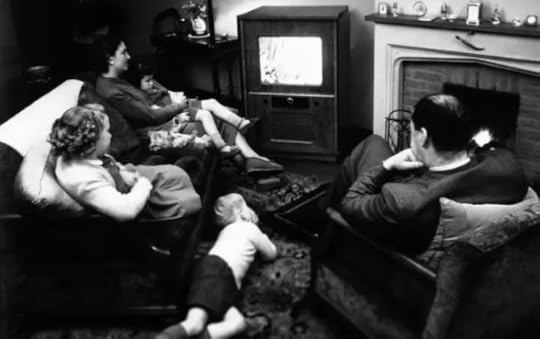
 Xt the Broadcasting Archives, we start the week with an intriguing look at how The Lucy Show almost wound up
breaking new ground
in television, and why the show didn't continue with its mildly feminist outlook.
Xt the Broadcasting Archives, we start the week with an intriguing look at how The Lucy Show almost wound up
breaking new ground
in television, and why the show didn't continue with its mildly feminist outlook.One of my favorite underappreciated shows is The Rogues, about a merry band of con men (Charles Boyer, David Niven, and Gig Young), and at Christmas TV History, Joanna continues her "Christmas in July" series with Boyer making merry in the Yuletide episode " Mr. White's Christmas ."
At Cinema Scholars, it's a look at the spy craze that became the in-thing on American television in the 1960s. It was fun for awhile, but from Batman to The Man from U.N.C.L.E. to Amos Burke, Secret Agent, camp took over and, one by one, many of them sank slowly into the sunset.
Jodie discusses one of the most difficult aspects of Dave Garroway's life at Garroway at Large, one that was also challenging to write about: Garroway's struggle with depression , and his ultimate suicide. This week she writes about how she tried to cover it with sensitivity and discretion.
John's series on The X-Files and the American Dream continues, and while his writeup of the episodes is very good, it's his exploration (as a non-American) of how the dream started out, and what it has become over the years, that adds significant value.
At The View from the Junkyard, we return to the world of The Avengers and " The Danger Makers ," a 1966 episode in which we get a glimpse of the difficulties a war veteran has when returning home, and what happens when they try to create some danger for themselves.
Finally, the website The Hits Just Keep On Comin' celebrates 19—count 'em, 19—years, and as is custom, JB takes a look at some of his favorites from the past year . Congratulations, JB, and I hope you've got 19 more in you! TV
Published on July 21, 2023 05:00
July 19, 2023
The Descent into Hell: "A Feasibility Study" (1964)
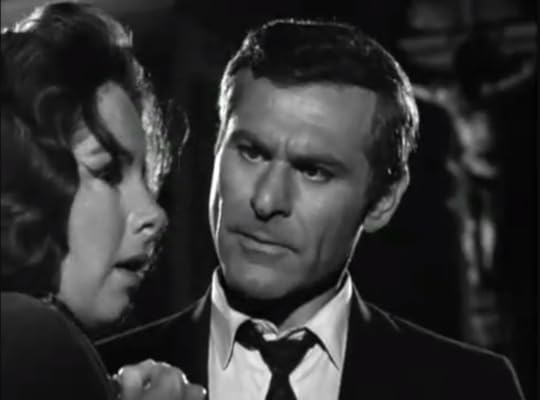
 It is hard enough to find anyone who will die on behalf of a just man, although perhaps there may be those who will face death for a good man. —Romans 5:7
It is hard enough to find anyone who will die on behalf of a just man, although perhaps there may be those who will face death for a good man. —Romans 5:7At the outset, the opening narration from the Control Voice tells us of the planet Luminos, a planet in a distant system. Earth scientists have concluded that the planet is too close to its sun to support life, but life exists there nonetheless, a strange and suffering form of life that now searches the galaxy for a planet with a healthy population—one that can be enslaved.
Meanwhlie, a man prepares to drive to the office, while his wife lovingly chides him about spending too much time at work. Next door, another man, breaking off a continuing argument with his wife, seeks refuge at church, but finds his car will not start. by going to church. Outside a mist has settled over the neighborhood—is it radioactive? Such are the mundane features of an everyday Sunday morning on Midgard Drive in Beverly Hills, USA, Earth, a neighborhood that is about to become the subject of a most unusual experiment—a feasibility study.
I
 Ralph Cashman (David Opatoshu), a driven businessman, prepares to go to the office on Sunday morning—he has a "success compulsion," according to his wife Rhea (Joyce Van Patten), who wants him to at least have breakfast first.
Ralph Cashman (David Opatoshu), a driven businessman, prepares to go to the office on Sunday morning—he has a "success compulsion," according to his wife Rhea (Joyce Van Patten), who wants him to at least have breakfast first. Outside, he meets his neighbor, Dr. Simon Holm (Sam Wanamaker). Simon’s car won’t start, so Ralph offers to give him a lift to church. Simon’s wife Andrea (Phyllis Love) appears in the doorway; they hadn’t said good-bye, and she’ll be gone by the time he gets back. On the way, Simon confides to Ralph that he and Andrea are separating. They’ve only been married a year and a week, but Simon says it’s been "long enough to find out we made an honest mistake."
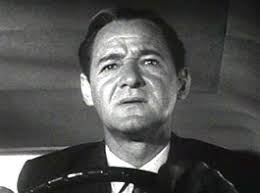 David OpatoshuAfter dropping Simon off at church, Ralph continues on his way to work. He drives into a heavy, cloud-like fog in front of him (always a mistake in these kinds of stories), so thick that it’s impossible to continue; when he stops the car to investigate, what looks like some kind of monstrous hand presses against the front windshield. He gets out of the car and finds himself in a rocky landscape, with three shadowy figures coming toward him. Running from them, he sees another hand, held up as if to stop him.
David OpatoshuAfter dropping Simon off at church, Ralph continues on his way to work. He drives into a heavy, cloud-like fog in front of him (always a mistake in these kinds of stories), so thick that it’s impossible to continue; when he stops the car to investigate, what looks like some kind of monstrous hand presses against the front windshield. He gets out of the car and finds himself in a rocky landscape, with three shadowy figures coming toward him. Running from them, he sees another hand, held up as if to stop him.Back in the neighborhood, Simon returns to find Andrea still home; she couldn’t call a taxi because the phone is out of order. It is obvious that Simon doesn’t want Andrea to leave, and he renews his plea to her to stay, but she is adamant. She won’t stay if Simon won’t let her have "some part of my life to live my own way." If you really love someone, you should be able to "understand another person’s heartbeat, even if the rhythm is different from yours." "I can’t live with you if life has to be lived according to your prescriptions," she tells Simon. "I can’t! No matter how benevolent or secure you’d make it, it’s slavery!" Simon replies that he’s not trying to run her life; "I just don’t want you wandering around the world with your camera and your typewriter worrying about everybody else, when I need you here, always, at home."
Their argument is interrupted by a scream from Rhea. Someone is walking up the sidewalk to her front door. When the figure collapses, Simon sees that it’s Ralph, his face and hands covered by grotesque skin eruptions, similar to those on the beings that surrounded Ralph’s car. Ralph warns Rhea, in a ghostly voice, that she must not touch him, and adds, "We’re not on Earth." His body then vanishes.
They next see a figure going into the garage. Rhea is sure it must be Ralph, but Andrea tells her it wasn’t even a man. He goes to the door, but a voice from inside the garage warns him not to come in. Simon tells Andrea to get the car in case they need to take whoever it is to the hospital; then, talking through the door, asks if he needs help or is hurt. The voice replies that he’s not hurt physically, just afraid. "I came through the shield," the voice says. "I’ll be punished if I spoil the experiment." He’s only 16, the voice says, "I’m almost an old man." He says he’ll go back, but they can’t see him. Simon tells Rhea to go back indoors. Meantime, Andrea waits in the car she was going to use to drive Ralph to the hospital. When the being emerges, he heads for the car and tells Andrea to take him back, "or I’ll touch you." Andrea speeds into the cloud, and Simon runs after her, disappearing from sight.
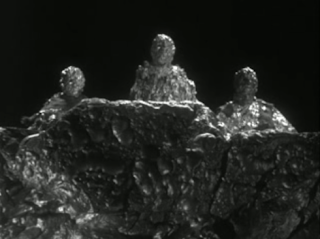 Emerging on the other side, Simon finds himself in the same unearthly setting that Ralph entered earlier, surrounded by the same creatures—ponderous figures, bodies encased in the same kind of rocky terrain as the planet’s surface, almost becoming part of the background. Simon sees Andrea suspended in a tube-like cylinder, before he is led in front of some kind of council. One of them, referred to in the credits as The Authority (voice of Ben Wright, physically played by Robert H. Justman), tells him that their entire neighborhood, six square blocks, has been teleported to the planet Luminos.
Emerging on the other side, Simon finds himself in the same unearthly setting that Ralph entered earlier, surrounded by the same creatures—ponderous figures, bodies encased in the same kind of rocky terrain as the planet’s surface, almost becoming part of the background. Simon sees Andrea suspended in a tube-like cylinder, before he is led in front of some kind of council. One of them, referred to in the credits as The Authority (voice of Ben Wright, physically played by Robert H. Justman), tells him that their entire neighborhood, six square blocks, has been teleported to the planet Luminos.The Authority explains that the Luminoid race has virtually no physical mobility. They are not born that way, but at a particular age, because of an organism in their genes, the skin eruptions begin, and their bodies begin to turn to stone, leaving them "doomed, immobile, unable to do anything but think," and requiring able-bodied beings to perform their work. This used to be done by Luminoid youth, but they have now rebelled, necessitating the need for another source of labor; the Earthlings are now part of an experiment, to test the feasibility of bringing the entire population of Earth to Luminous as slave labor. They have nothing to fear; they will be happy, their lives comfortable and secure. The Authority tells Simon that Andrea will be returned to their home presently, and that he should "tell your neighbors to fear no fears and dream no dreams of escape—for there is no escape."
II
There’s an interesting footnote to this, as writer Ted Rypel observes: the fact that the Luminoid children have apparently rebelled, necessitating the Luminoids’ mission to abduct and enslave the Earthlings. Does this imply that the desire for freedom isn’t the sole province of humans, that it’s somehow inherent in all sentient beings? Or does the appearance of the Luminoid youth, curious to see what exists outside the foggy barrier, suggest that the young are alike all over, rebelling against their parents and against the system, nothing more than a Luminoid Rebel Without a Cause?
III
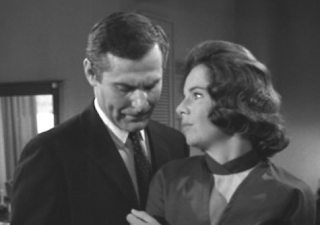 Sam Wanamaker and Phyllis LoveReturning to their home, Simon finds Andrea there; she explains that the Luminoids used a sterilizing gas on her; even though the boy didn’t touch her, they breathed the same air and the Luminoids used the gas as a precaution. They realize now that they never stopped loving each other, and each asks forgiveness for having tried to change the other. "I didn’t want to leave you," Andrea says, and Simon replies, "I gave you no choice." The truth of her earlier words must have occurred to him: No matter how benevolent or secure you’d make it, it’s slavery!
Sam Wanamaker and Phyllis LoveReturning to their home, Simon finds Andrea there; she explains that the Luminoids used a sterilizing gas on her; even though the boy didn’t touch her, they breathed the same air and the Luminoids used the gas as a precaution. They realize now that they never stopped loving each other, and each asks forgiveness for having tried to change the other. "I didn’t want to leave you," Andrea says, and Simon replies, "I gave you no choice." The truth of her earlier words must have occurred to him: No matter how benevolent or secure you’d make it, it’s slavery!"That’s the whole bright mystique of life, choice," Simon tells her. "Maybe that’s what the soul is. Choice."
"Can we live with the loss of it?" Andrea asks.
"Perhaps," Simon replies. "But I think it would be better to die trying to win it back."
Simon decides they must alert the rest of their neighbors to what has happened, and set up a meeting in the church, to discuss what they must do. Andrea tells Simon she’ll meet him there, and after he leaves, she looks at herself in the mirror, at the first sign of eruption that’s started to break out on her shoulder.
As everyone gathers in the church, Simon looks for Andrea, but the priest, Father Fontana, assures him that she will show up. To the group, Simon now explains what the Luminoids plan for them. As Father Fontana recites The Lord's Prayer, someone starts pounding at the door. Simon, thinking it is Andrea, implores the two men guarding the door to let her in; when they refuse, Father Fontana approaches them and raises his hand, palm facing the doors as if in the form of a blessing, and the men part. Outside is Ralph, fully enveloped in the disease. The priest moves to take Ralph in his arms, but is held back by Simon; the rest shrink back in fear and horror.
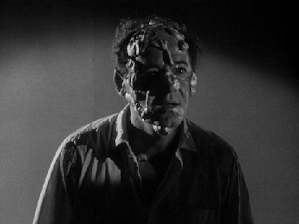 Ralph stands in the doorway: alone, weeping, utterly desolate. Rhea runs to him, but Ralph will not let her touch him. We see that Andrea is also there, standing behind Ralph. She now admits to Simon that she, too, has been infected, just from the time she spent in the car with the boy, breathing the same air.
Ralph stands in the doorway: alone, weeping, utterly desolate. Rhea runs to him, but Ralph will not let her touch him. We see that Andrea is also there, standing behind Ralph. She now admits to Simon that she, too, has been infected, just from the time she spent in the car with the boy, breathing the same air.Simon then turns back to the rest, and bluntly tells them there is no way of escape, no way back to Earth. Their future is as slave labor. They don’t have to suffer the same fate as Ralph, not as long as they remain in their homes and don’t travel more than six blocks in any direction; even if some, like Andrea, catch the disease through the air, enough of them will survive to make the experiment feasible. And then the Luminoids will teleport the entire population of Earth to the planet to be enslaved. "We will live in labor camps," he says, "we will toil and sweat and die in controlled areas."
But we have a choice, he reminds them. Human choice. They can let the Luminoids know that they will not simply stand by while the entire human race is enslaved. They can choose to voluntarily expose themselves to the disease, to become what the Luminoids are. "My wife has already been infected," he tells them. "I’m going to take her hand. Will someone take mine?"
After a moment’s hesitation, Andrea stretches out her hand, which is taken by Simon. Rhea then takes Simon’s other hand; her free hand, in turn, is grasped by Father Fontana, and in turn the others, one by one, form a human chain, hand in hand. A chain forged by love, and a resolution to thwart the Luminoid plan.
A final image shows the crater that marks where the Midgard neighborhood once stood. An official sign has been posted telling people not to enter the area due to threat of possible radioactive dirt or rocks, and asks anyone with knowledge concerning the disappearance to contact the police. The Control Voice advises us that the Luminoid feasibility study has concluded. "Abduction of human race: infeasible."
IV
Watching the first half of "A Feasibility Study," a viewer might reasonably wonder why I’ve chosen to include it in this series. It unfolds as a mystery, a domestic drama, a science fiction story complete with alien monsters. A horror story to be sure, but not the same kind of horror that we’ve witnessed here.
That is the way it is, the way events sneak up on you until, before you know it, you find yourself in the middle of it.
Of course, what "A Feasibility Study" is really about is slavery, among other things, but a unique and most seductive kind of slavery, that of the velvet fist. As the Authority tells Simon, "You will be happy. Your lives here will be comfortable and secure, and you will be free to worship and love and think as haphazardly as usual." Kind of like You will own nothing, and you will be happy, don’t you think? I can’t remember who said that, but I’m sure you know what I mean.
The power of Joseph Stefano’s script is that the horror of slavery is never seen. There are no scenes of tortures, of beatings, of vengeful masters whipping helpless slaves trying to escape. These masters are literate, even eloquent, not the monsters of "1984" and "Darkness at Noon." And talk about accommodating—or at least practical, for as Simon tells his fellow humans, we are no good to them dead. No, I think Stefano trusts us to understand this; he never even bothers to explain what type of work the slaves are to carry out, and in truth it makes no difference, for the kind of slavery he’s talking about doesn’t require work; it merely requires people to let themselves be led around like sheep—unthinking, uncaring, unfeeling.
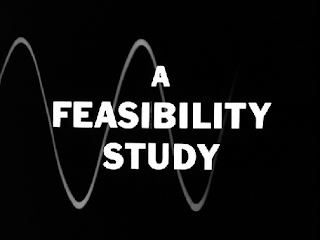 Where "A Feasibility Study" makes its point is in presenting the alternative to slavery, what David Schow, co-author of The Outer Limits: The Official Companion, describes as "vivid sketches of the human spirit." It is what the Luminoids, for all their advanced knowledge, could not anticipate: the power of caring, of loving, of sacrifice; of overcoming fear and uncertainty; most of all, the power of choice. For Stefano, human beings by definition cannot be sheep, are incapable of being sheep, as long as they have free will and an intellect, as long as they are capable of choice. Of course, if one chooses to be a sheep, there is nothing stopping them.
Where "A Feasibility Study" makes its point is in presenting the alternative to slavery, what David Schow, co-author of The Outer Limits: The Official Companion, describes as "vivid sketches of the human spirit." It is what the Luminoids, for all their advanced knowledge, could not anticipate: the power of caring, of loving, of sacrifice; of overcoming fear and uncertainty; most of all, the power of choice. For Stefano, human beings by definition cannot be sheep, are incapable of being sheep, as long as they have free will and an intellect, as long as they are capable of choice. Of course, if one chooses to be a sheep, there is nothing stopping them.(Incidentally, about the name of the street everyone lives on, Midgard Drive: According to Norse legend, Midgard describes "the world inhabited by men," and J.R.R. Tolkien derived from it the term Middle-earth. Midgard was also said to be surrounded by Jotunheim: the world of the hostile giants.)
"A Feasibility Study" was the ninth episode in the production cycle, wrapping up in August 1964, but it would not air until eight months later, on April 13, 1965, as the series’ 29th episode. The delay was unwelcome, but not exactly unexpected; "There was enough thinking going on in The Outer Limits to worry people," recalled the show’s creator, Leslie Stevens, and approval from the network’s Standards and Practices department was unusually slow in coming. ABC was particularly nervous about the ending, which network censor Dorothy Brown read as condoning mass suicide. "She saw the act of martyrdom as a negative gesture rather than a noble one," Stefano said. "But I probably proved my point when ABC saw the finished film, with everyone joining hands. It was very moving and inspirational, and that’s when they approved it."
A few words about the performances of the principals in the cast. Sam Wanamaker and Phyllis Love as Simon and Andrea Holm, display a quiet vulnerability that, once they reunite, turns to strength and courage. David Opatoshu* and Joyce Van Patten, as Ralph and Rhea Cashman, inject their brief scenes together with the comfortable affection borne of a successful marriage; Opatoshu’s reappearance as the infected Ralph is simply heartbreaking, and Van Patten’s response is both touching and inspiring. Ben Wright, providing the voice of The Authority, is appropriately superior and distainful; Frank Puglia, in the small but not unimportant role of Father Fontana, projects a quiet power and spirituality, particularly in the closing scene.
*You’ll remember him from the earlier essay on the Star Trek episode "A Taste of Armageddon," where he played a considerably less honorable character.
The unsettling atmosphere of the planet Luminos, its oppressive fog and darkness contrasting with the everyday normality of the human neighborhood to create a growing sense of impending doom, is portrayed in stunning, glorious black and white by cinematographer John Nickolaus; the poignancy of the episode’s final scene, as the humans commit to their heroic sacrifice, is enhanced by the lovely, heartrending music of Dominic Frontiere—and, surprisingly, it wasn’t even composed specifically for the episode, instead consisting of musical cues composed for other Outer Limits episodes.
While critics were divided on the merits of the story, "A Feasibility Study" struck a note in viewers that made it one of the most-remembered episodes of the series, a profoundly moving meditation with a singularly memorable ending. If there isn’t a moment in it that causes you to think about your life and the lives of your family and loved ones—well, there’s something about you that just isn’t human.
V
There can be no return, Simon tells his fellow slaves. No escape, no way back to Earth and their former lives. It does not, however, mean that there is no alternative. "We can choose to make their enslavement of our Earth infeasible. We can choose not to escape infection. We can deliberately become what they are."
The climactic scene of "A Feasibility Study" takes place, appropriately, in a church. It is there that we see the symbols of religion most clearly: the candles, the statues, the Rosary beads. And at the heart of it, looming ever-present in the darkness as Simon makes his impassioned plea, the symbol of the ultimate sacrifice, the Crucifix.
This is not the first time we’ve discussed an act of self-sacrifice here; "Dialogues of the Carmelites," "Murder in the Cathedral," and "The Obsolete Man" all end with the protagonists accepting their deaths with courage, defiance, and faith—a reminder that death is not the end of life.
But even if we were in a studio stripped bare of any decoration, we wouldn’t be able to overlook the religious aspect of this drama, and I can’t help but wonder if this caused any of ABC’s discomfort, because it leads to some uncomfortable questions, the biggest of which being the nature of free will.
Free will is one of the greatest mysteries of life. Why do we have it? The standard answer is that we were given it in order that we might choose good over evil, right over wrong, things you probably learned in Sunday School.
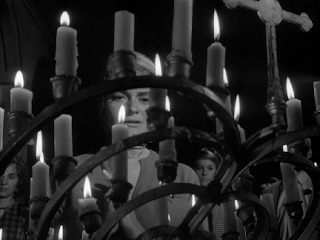 Joyce Van Patten That leads to a whole other series of questions, of course. We wonder about those who choose evil, who use their free will to commit acts that we recognize as bad or immoral, often with consequences for the innocent. Why does God allow bad things to happen to good people? Where is the justice in that? On the flip side, though, one asks if an act can be truly good if it is not freely chosen? Would a good deed be praiseworthy if it was done without choosing, without considering the ramifications, if it were as automatic as breathing?
Joyce Van Patten That leads to a whole other series of questions, of course. We wonder about those who choose evil, who use their free will to commit acts that we recognize as bad or immoral, often with consequences for the innocent. Why does God allow bad things to happen to good people? Where is the justice in that? On the flip side, though, one asks if an act can be truly good if it is not freely chosen? Would a good deed be praiseworthy if it was done without choosing, without considering the ramifications, if it were as automatic as breathing? Whether we like it or not, free will is a gift to us, one that asks of us that we exercise it thoughtfully. It tests our mettle, shows what we’re made of, appeals to both the best and the worst in us. Most of all, it asks us to choose. "That’s the whole bright mystique of life, isn’t it?" Simon muses. "Choice. Maybe that’s what the soul is: choice." Those people I mentioned above all had something in common: they were given a choice, and their choices were driven by their faith.
For the Carmelites, they chose to offer their lives as martyrdom, moved by a faith that, by being persecuted for their beliefs, the fire of hatred that inflamed the revolution would become uncontrollable and would wind up consuming itself and burning out, leading to divine graces for the people and for France. And especially for Blanche, the young sister who had fled in order to save her life and then had returned so that she could give it up, the knowledge that she would no longer be ruled by fear.
For Thomas Becket, the Archbishop of Canterbury locked in a struggle with King Henry II, he has only to submit to the authority of the king to avoid death; but having returned to England from France, and the protection of King Louis VII, he chose to remain in an unlocked Canterbury Cathedral despite the pleadings of his monks to either flee or barricade himself inside, and instead faced the knights he knew would assassinate him.
For Romney Wordsworth, the obsolete man, his choice was to accept death as an act of resistance, echoing the words of St. Paul, "Death, where is thy sting?" And, as he sat in his room reading from his banned Bible and honoring a faith he refused to renounce, he might have hoped that the people would realize that the emperor had no clothes, that the Chancellor was driven by fear just like they were; and that therefore, they could defeat him, bring down the State, and show that no man is obsolete.
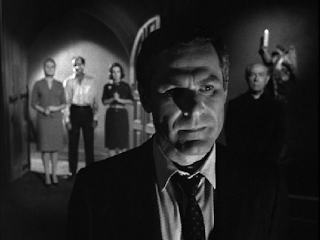 All of them faced execution as punishment for their choice. By contrast, the deal offered to the humans on Luminos seems to be a pretty good one. The Luminoids "don’t intend to harm us," as Simon points out. "They want us strong and well. They need our strength." True, you could die just from breathing the same air, but we can chalk that up to the same risks we face every day; after all, getting out of bed in the morning is a risk, we often remind ourselves. Whatever it is that they have to do as slaves to the Luminoids, one could envision living a good life, or at least a tolerable one. Get up in the morning, go off to work, come back in the evening, have dinner, catch up with the wife and kiddies, and go to bed. You can even go to church on Sunday! And anyway, aren’t we all just wage slaves already, working for The Man every night and day?
All of them faced execution as punishment for their choice. By contrast, the deal offered to the humans on Luminos seems to be a pretty good one. The Luminoids "don’t intend to harm us," as Simon points out. "They want us strong and well. They need our strength." True, you could die just from breathing the same air, but we can chalk that up to the same risks we face every day; after all, getting out of bed in the morning is a risk, we often remind ourselves. Whatever it is that they have to do as slaves to the Luminoids, one could envision living a good life, or at least a tolerable one. Get up in the morning, go off to work, come back in the evening, have dinner, catch up with the wife and kiddies, and go to bed. You can even go to church on Sunday! And anyway, aren’t we all just wage slaves already, working for The Man every night and day?But the Carmelites, Becket, Wordsworth, the Luminoid slaves: they’re all human beings. And, as Simon tells them, we can choose.
We can choose.
In a way Dorothy Brown was correct; without that faith, and without that freedom to choose, there is no sacrifice: it simply amounts to mass suicide.
VI
I’ve written about fear many times in this series; it’s a theme that runs through most of these stories. Fear is the greatest destructive power on Earth, one of the most fearsome human emotions, for those who know how to use it. Fear of authority, fear of reprisal, fear of being a non-conformist; fear of the unknown, fear of the future. The totalitarian state is constructed on fear; it is what the overlords count on—what they depend on—to remain in power. It is also what drives them; fear of the loss of power.
For fear to be overcome, it first has to be acknowledged, recognized for what it is. The phrase "Be not afraid," or variations thereof, appears more often in the Bible than any other admonition. The great entertainer Sammy Davis Jr. once said that "reality is fear of the unknown waiting around the bend." In the British science fiction series Doctor Who, the title character accepts death as the price for overcoming fear; "I had to face my fear," he says. "That was more important than just going on living."
In "A Feasibility Study," the Luminoids are banking on the human fear of death, and the willingness to do anything to avoid that death. The Authority astutely sized up the Earthling as "vain fleshmen who love their bodies above all else that nature has given to them," and concludes that, "you will obey. At the threat of our touch, you will obey." And in truth, it’s hard to blame them for coming to that conclusion. After all, look at what the human race did in the name of a virus that had a survival rate in the upper 90s. They subjected themselves to an untested "vaccine" without regard to the possible side effects, closed down society and business, demonized anyone who "questioned the science."
But that’s not all. Over the last few decades, humans have become so sensitive to any kind of risk that it’s almost pathological. From food allergies to antibacterial soap, fear and disease lurks around every corner. Understand that this isn’t to demean or diminish those who actually suffer from such maladies, but one has to wonder sometimes if the preventative actions we take aren’t, in fact, responsible for the ailments in the first place; a basic exposure to germs, for example, is necessary to the development of a functioning immune system.
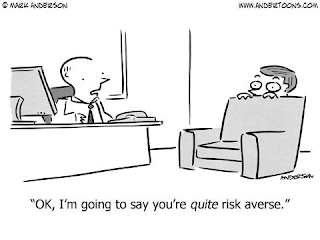 No, for all the bluster about how savage humans are at heart (a theme of many a science-fiction story, including ones seen on The Outer Limits), we’re actually quite timid when it comes to it, so risk-averse that one wonders what value there is to a life that doesn’t allow for taking chances. I’m fond of quoting Harry Reasoner, the legendary television newsman, who wrote that "The idea of trying to outguess life, to avoid everything that might conceivably injury your life, is a particularly dangerous one. Pretty soon you are existing in a morass of fear." Life asks a great deal of man in exchange for what it provides, but "if life asks him to cringe in front of all reasonable indulgence, he may at the end say life is not worth it. Because for the cringing he may get one day extra or none; he never gets eternity."
No, for all the bluster about how savage humans are at heart (a theme of many a science-fiction story, including ones seen on The Outer Limits), we’re actually quite timid when it comes to it, so risk-averse that one wonders what value there is to a life that doesn’t allow for taking chances. I’m fond of quoting Harry Reasoner, the legendary television newsman, who wrote that "The idea of trying to outguess life, to avoid everything that might conceivably injury your life, is a particularly dangerous one. Pretty soon you are existing in a morass of fear." Life asks a great deal of man in exchange for what it provides, but "if life asks him to cringe in front of all reasonable indulgence, he may at the end say life is not worth it. Because for the cringing he may get one day extra or none; he never gets eternity."So the Luminoids could hardly be blamed for believing that their human captives would accept slavery rather than suffer the consequences. They would have looked at this as manna from heaven, absolute proof that they could exploit that fear into creating a slave race.
But there is one thing that can overcome fear, and that is love. It is the equalizer, the great healing power, because without love there can be no sacrifice, not really. And a very interesting thing about "A Feasibility Study" is that it is about love as much as it is fear. The first half of the story highlights the absence of love, or at least the relegation of love to a lesser status. Despite their words, it’s obvious that Simon and Andrea love each other, but they won’t let that love breathe through layers of ambition and disappointment and cynicism. It’s only when they’re confronted by something that is bigger than either of them that they realize how only by coming together can they face it.
And if the first part of the story is about the absence of love, then the conclusion shows us what happens when love is allowed to overcome fear. It’s what happens when Simon and Andrea support each other and, in doing so, gain the strength to defeat it. It’s what happens when Father Fontana approaches the church doors and, with a simple gesture, is able to move aside the two men barring entrance to the church, reminding them that the church closes its doors to no one. It’s what happens when, in one of the most moving scenes in the drama, the weeping David is comforted by his wife Rhea, who is not afraid to go to him.
Another thing that occurs to me: you might have noticed than when Father Fontana opens the door and finds the infected David standing there, his first instinct is to reach out to him until he is restrained by Simon. I don’t know if Joseph Stefano or anyone involved in makeup for the show had this in mind, but the effect of David’s appearance there evoked, at least in me, an image of someone infected by leprosy—a disease which, similarly, caused people to recoil in horror for fear of contamination. And I thought of Fr. Damien, the Catholic priest who treated the lepers of Molokai and eventually was infected himself; it is said that in his first sermon after the diagnosis, instead of his usual greeting of "My fellow believers," he began, "My fellow lepers." A small moment, perhaps.
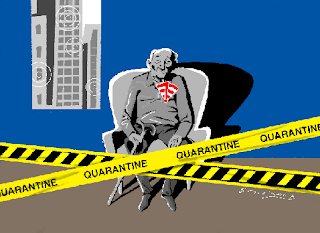 Perhaps the most inhuman thing the human race did during the virus scare was to intentionally isolate themselves from each other, to cut off the most vulnerable from human companionship and contact. How many times we heard of those not allowed to see their loved ones in a hospital or nursing home, not able to furnish them with companionship, not able to be with them in their last hours of life. They not only reacted out of fear—fear that had been imposed on them—they themselves stoked that fear, added to it until it became hysteria.
Perhaps the most inhuman thing the human race did during the virus scare was to intentionally isolate themselves from each other, to cut off the most vulnerable from human companionship and contact. How many times we heard of those not allowed to see their loved ones in a hospital or nursing home, not able to furnish them with companionship, not able to be with them in their last hours of life. They not only reacted out of fear—fear that had been imposed on them—they themselves stoked that fear, added to it until it became hysteria.That contact, the human touch and the love that comes with it—so simple, and yet we deliberately, willingly removed it from use. There was a lot of talk thrown around at the time about caring for others, about this isolation being an act of love. In some specific cases, there may well have been a medical justification for it. But make no mistake—this was no act of love. There was no love involved in it.
VII
Death does not mean that life has ended, but merely changed.
There is a tendency, in all allegorical stories, to view them as something of a commentary on current affairs, a way to offer a thought-provoking or unpopular take on something that’s part of the zeitgeist. In this case, one would be forced to look at the threat of communism or the fight for civil rights as inspirations for "A Feasibility Study." (Ironic, considering that proponents of civil rights were often accused of being part of the communist threat. And certainly that possibility can’t be ignored.
However, the issues that Joseph Stefano explores—freedom, choice, love, fear—go far what would have been necessary to make a simple plea for tolerance. For that reason, I’m convinced that Stefano did not want the episode to be seen purely through the lens of contemporary events. For him, the idea of martyrdom, the voluntary sacrificing of life in order preserve the human race, seems to have been his main interest, and there’s no way to fully understand and appreciate that aspect without looking at everything else. And those are timeless themes, applicable to any era.
When I rewatched "A Feasibility Study" episode for this essay, I couldn’t help thinking about the passengers of United Airlines Flight 93, the flight that crashed in Stonycreek Township, Pennsylvania on September 11, 2001. You remember: the passengers, having learned from their phones of the attacks on the World Trade Center and the Pentagon, fought back against their hijackers, forcing the plane to crash well short of its intended target. Like the humans held captive by the Luminoids, they understood that they could not escape, that there would be no return to their former lives, their friends and loved ones.
But those passengers understood—their actions indicate they must have understood—that even though the fact of their deaths could not change, the meaning of their deaths could, and would. They would die at the hands of their captors, or they would sacrifice their lives to prevent their captors from accomplishing their goal, and taking yet more innocent lives. Either way, they would be dead—but nothing else would be the same. One can choose to die as a slave, or to die as a free man.
We can choose.
There is one major difference in these sacrifices. The whole world would know soon enough about what happened on Flight 93, and that their rebellion, directly or indirectly, would lead to the crash of the plane, the failure of its mission. The sacrificial act made on Luminos, on the other hand, will go unknown by the billions on Earth, including many who may not have merited it. They will supply no encouragement; they will raise no standard under which others can choose to fight back, there will be no shrine constructed in their honor. In fact, were you to ask Simon, he might tell you that this is the way it had to be, for it would mean that their rebellion had succeeded, that the continued teleportation of Earthlings had been found to be unfeasible, that no one on Earth would ever know about it.
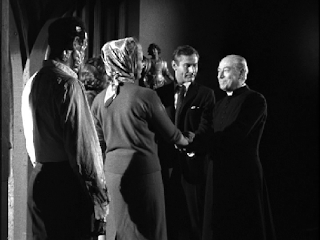 And while those on Earth might remain ignorant of what happened, we can observe that there is a lesson to be taken from it all, which is that freedom is something intrinsic in the human spirit. It may lie submerged, deep in the recesses of the psyche, perhaps for generations at a time; nevertheless, it exists, waiting for the moment when it will be called on, when a spark will bring it to life.
And while those on Earth might remain ignorant of what happened, we can observe that there is a lesson to be taken from it all, which is that freedom is something intrinsic in the human spirit. It may lie submerged, deep in the recesses of the psyche, perhaps for generations at a time; nevertheless, it exists, waiting for the moment when it will be called on, when a spark will bring it to life. "It is for freedom that Christ has set us free," St. Paul writes to the Galatians. "Stand firm, then, and do not let yourselves be burdened again by a yoke of slavery." The apostle was writing about the slavery of sin, but there is more than one kind of slavery, just as there is more than one kind of freedom. The Luminoids did not understand that, but we do, because humans have always had to fight for their freedom.
We can choose.
Some people look at the ending as sad, depressing, but that’s not how I see it, not really; in fact, I’m rather encouraged by it, because it suggests the indominable spirit of the human being, the desire for freedom, and the ability to love. Even in these times, the times in which we live today, it’s comforting to think that this spirit is ingrained in us, even when we doubt its existence. I think it’s natural to wonder if, when put to the test, we’ll really respond the way we hope we would, we’ll make the right choice.
The Luminoids would have accused their would-be slaves of having chosen death, but in reality they chose freedom. They chose life. Possibly—just possibly—we will, too. TV
Published on July 19, 2023 05:00
July 17, 2023
What's on TV? Friday, July 21, 1967

 Tonight's debut show on ABC is Malibu U., hosted by Ricky Nelson during his "Rick" years. It runs for seven episodes, which is probably all that were planned; still, it's always a bad sign when a variety show has to resort to a "premise," and the premise of this one has Rick as "the dean of a mythical University at Malibu Beach," with a curriculum that covers "surfing, dancing, boy-and-girl watching and educational journeys to bizarre classrooms" including a bikini factory. Why they couldn't have just had people show up and sing, I don't know. Maybe if Dick Clark had been the producer, they would have. Meanwhile, all seven episodes exist on YouTube, and you can see tonight's show
here
. The listings this week come from the Northern California edition, which is the opposite end of the state from Malibu.
Tonight's debut show on ABC is Malibu U., hosted by Ricky Nelson during his "Rick" years. It runs for seven episodes, which is probably all that were planned; still, it's always a bad sign when a variety show has to resort to a "premise," and the premise of this one has Rick as "the dean of a mythical University at Malibu Beach," with a curriculum that covers "surfing, dancing, boy-and-girl watching and educational journeys to bizarre classrooms" including a bikini factory. Why they couldn't have just had people show up and sing, I don't know. Maybe if Dick Clark had been the producer, they would have. Meanwhile, all seven episodes exist on YouTube, and you can see tonight's show
here
. The listings this week come from the Northern California edition, which is the opposite end of the state from Malibu. -2- KTVU (BAY AREA) (IND.) Morning 8:45 RELIGION TODAY—Catholic 9:00 POPEYE—Cartoons COLOR 9:30 ROMPER ROOM—Children 10:30 JACK LA LANNE COLOR 11:00 STAR PERFORMANCE—Drama 11:30 NEWS—Claud Mann Afternoon 12:00 CHARLEY AND HUMPHREY 12:30 MERV GRIFFIN—Variety Guests: Bob Crosby, Morey Amsterdam, Betty Walker, Lee Tully, Alia Kashi, Don Wyatt 1:00 MOVIE—Police Dialing for Dollars: “Finger Man” (1955) 2:55 NEWS 3:00 TRUTH OR CONSEQUENCES—Game COLOR 3:30 CAPTAIN SATELLITE—Children 4:30 STINGRAY—Children COLOR 5:00 SUPERMAN—Adventure 5:30 DENNIS THE MENACE—Comedy Evening 6:00 LEAVE IT TO BEAVER—Comedy 6:30 McHALE’S NAVY—Comedy 7:00 DEATH VALLEY DAYS—Drama COLOR 7:30 TRUTH OR CONSEQUENCES—Game COLOR 8:00 DR. KILDARE—Drama 9:00 ALL-STAR WRESTLING 10:00 NEWS—Atkinson, Park, Alberts 10:30 ALFRED HITCHCOCK—Drama 11:00 MOVIE—Drama “The Dam Busters” (English; 1954) 1:00 MOVIE—Western COLOR Time approximate. “Fort Worth” (1951)
-3- KCRA (SACRAMENTO) (NBC) Morning 5:55 FARM NEWS COLOR 6:00 RHYME AND REASON 7:00 TODAY COLOR Guests: The New Christy Minstrels, Bill Blass. Hugh Downs, Barbara Walters 9:00 SNAP JUDGMENT—Game COLOR Guests: Morey Amsterdam, Rose Marie 9:25 NEWS—Sander Vanocur COLOR 9:30 CONCENTRATION—Game COLOR 10:00 PERSONALITY GAME COLOR Celebrities: Barbara Feldon, Sheila MacRae, Dick Shawn. On film: Hugh O’Brian 10:30 HOLLYWOOD SQUARES COLOR Celebrities: Victor Buono, Fred Clark, Redd Foxx, Hermione Gingold, Ruta Lee, Janis Paige, Bobby Rydell 11:00 JEOPARDY COLOR 11:30 EYE GUESS COLOR 11:55 NEWS COLOR Afternoon 12:00 NEWS COLOR 12:30 MERV GRIFFIN—Variety Guests: Bob Crosby, Morey Amsterdam, Betty Walker, Lee Tully, Alia Kashi, Don Wyatt 1:30 ANOTHER WORLD COLOR 2:00 YOU DON’T SAY!—Game COLOR Guests: William Shatner, Patricia Crowley 2:30 MOVIE—Mystery “Thunder on the Hill” (1951) 4:00 SECRET AGENT—Adventure 5:00 SUPER HEROES COLOR 5:20 TRAVENTURE THEATRE COLOR 5:55 SPORTS—Eriksen COLOR Evening 6:00 NEWS—Chet Huntley, David Brinkley COLOR 6:30 NEWS COLOR 7:30 TARZAN—Adventure COLOR 8:30 MAN FROM U.N.C.L.E. COLOR 9:30 MOVIE—Comedy “Abbott and Costello Meet the Keystone Kops” (1955) 11:00 NEWS COLOR 11:30 TONIGHT COLOR 1:00 NEWS COLOR
-4- KRON (BAY AREA) (NBC) Morning 6:25 FARM NEWS 6:30 PROFILE—San Diego State 7:00 TODAY COLOR Guests: The New Christy Minstrels, Bill Blass. Hugh Downs, Barbara Walters 9:00 SNAP JUDGMENT—Game COLOR Guests: Morey Amsterdam, Rose Marie 9:25 NEWS—Sander Vanocur COLOR 9:30 CONCENTRATION—Game COLOR 10:00 PERSONALITY GAME COLOR Celebrities: Barbara Feldon, Sheila MacRae, Dick Shawn. On film: Hugh O’Brian 10:30 HOLLYWOOD SQUARES COLOR Celebrities: Victor Buono, Fred Clark, Redd Foxx, Hermione Gingold, Ruta Lee, Janis Paige, Bobby Rydell 11:00 JEOPARDY COLOR 11:30 EYE GUESS COLOR 11:55 NEWS COLOR Afternoon 12:00 LET’S MAKE A DEAL—Game COLOR 12:25 NEWS COLOR 12:30 DAYS OF OUR LIVES COLOR 1:00 DOCTORS—Serial COLOR 1:30 ANOTHER WORLD COLOR 2:00 YOU DON’T SAY!—Game COLOR Guests: William Shatner, Patricia Crowley 2:30 MATCH GAME COLOR Guests: Mitch Miller, Abby Dalton. Host: Gene Rayburn 2:55 NEWS COLOR 3:00 BACHELOR FATHER—Comedy 3:30 DIVORCE COURT—Drama 4:00 PANORAMA—Interviews 4:30 PICK A SHOW—Game 5:00 FLINTSTONE—Cartoon COLOR 5:30 CAR 54—Comedy Evening 6:00 NEWS 6:30 NEWS—Chet Huntley, David Brinkley COLOR 7:00 ADDAMS FAMILY—Comedy 7:30 TARZAN—Adventure COLOR 8:30 MAN FROM U.N.C.L.E. COLOR 9:30 T.H.E. CAT—Adventure COLOR 10:00 LAREDO—Western COLOR 11:00 NEWS 11:30 TONIGHT COLOR 1:00 MOVIE—All Night 1. Guest in the House” (Drama; 1944) 2 COLOR “Flame of the Islands” (Drama; 1955) 3. “Return of the Fly” (Science Fiction; 1959)
-5- KPIX (BAY AREA) (CBS) Morning 6:00 SUMMER SEMESTER Urban Issues 6:30 ART OF THE ACTOR—Education Motivation for acting 7:05 NEWS—Joseph Benti COLOR 7:30 NEWS—Jim Anderson 8:00 CAPTAIN KANGAROO 9:00 CANDID CAMERA 9:30 BEVERLY HILLBILLIES 10:00 ANDY GRIFFITH 10:30 DICK VAN DYKE 11:00 LOVE OF LIFE—Serial COLOR 11:25 NEWS COLOR 11:30 SEARCH FOR TOMORROW—Serial COLOR 11:45 GUIDING LIGHT COLOR Afternoon 12:00 NEWS—Weston, Bentley COLOR 12:30 AS THE WORLD TURNS—Serial COLOR 1:00 PASSWORD—Game COLOR Guests: Jack Carter, Florence Henderson 1:30 HOUSE PARTY COLOR Guest: Edith Head 2:00 TO TELL THE TRUTH—Game COLOR 2:25 NEWS COLOR 2:30 EDGE OF NIGHT 3:00 SECRET STORM 3:30 MIKE DOUGLAS—Variety COLOR Guests: Buddy Rich, Judge Lester H. Loble 5:00 MERV GRIFFIN—Variety Guests: Bob Crosby, Morey Amsterdam, Betty Walker, Lee Tully, Alia Kashi, Don Wyatt Evening 6:00 NEWS—Weston, Dill COLOR 6:30 NEWS—Walter Cronkite COLOR 7:00 HAVE GUN—WILL TRAVEL 7:30 WILD WILD WEST COLOR 8:30 HOGAN’S HEROES COLOR 9:00 MOVIE—Drama “Underworld, U.S.A.” (1960) 11:00 NEWS COLOR 11:30 MOVIE—Adventure COLOR “Ice Palace” (1960) 2:15 77 SUNSET STRIP—Mystery
-6- KVIE (SACRAMENTO) (EDUC.) Afternoon 5:45 FRIENDLY GIANT—Children Evening 6:00 TURN OF THE CENTURY 6:30 MUSICAL PORTRAITS 7:00 WHAT’S NEW—Children 7:30 POPULATION PROBLEM 8:30 STANDWELLS—Puppets 9:00 LIVING FOR THE SIXTIES Host: Kitty Carlisle. Guests: A.E. Hotchner, John Diebold 9:30 NET PLAYHOUSE—Comedy “The Victorians: London Assurance”
-7- KGO (BAY AREA) (ABC) Morning 6:00 A.M.—Dunbar, Dunn 8:00 VIRGINIA GRAHAM—Interviews Guests: Judi West, Margaret Whiting, Pia Lindstrom 8:30 MOVIE—Drama Pat Montandon’s Prize Movie: “Women’s Prison” (1955) 10:30 DATELINE: HOLLYWOOD Guest: Hayley Mills 10:55 CHILDREN’S DOCTOR—Advice COLOR 11:00 HONEYMOON RACE—Game COLOR 11:30 FAMILY GAME Afternoon 12:00 EVERYBODY’S TALKING Celebrities: Tammy Grimes, Dwayne Hickman, Pat Paulsen 12:30 DONNA REED—Comedy 1:00 FUGITIVE—Drama 2:00 NEWLYWED GAME—Bob Eubanks COLOR 2:30 DREAM GIRL COLOR Guests: Frank Aletter, Louis Nye, Margaret O’Brien, Barry Sullivan 2:55 NEWS COLOR 3:00 GENERAL HOSPITAL 3:30 DARK SHADOWS 4:00 DATING GAME COLOR 4:30 GYPSY ROSE LEE—Interviews COLOR Guests: Sergio Franchi, Nichele Nichols 5:00 NEWS—Grimsby, Foster COLOR 5:30 NEWS—Peter Jennings COLOR Evening 6:00 MOVIE—Western COLOR “Broken Arrow” (1950) 7:30 TIME TUNNEL COLOR 8:30 MALIBU U.—Variety DEBUT COLOR Host: Rick Nelson. Guests: The Four Seasons with Frankie Valli, Annette Funicello, Don Ho 9:00 RANGO—Comedy COLOR 9:30 PHYLLIS DILLER COLOR 10:00 AVENGERS—Adventure 11:00 NEWS COLOR 11:30 JOEY BISHOP COLOR
7 KRCR (REDDING) (ABC, NBC) Morning 7:00 TODAY COLOR Guests: The New Christy Minstrels, Bill Blass. Hugh Downs, Barbara Walters 9:00 JACK LA LANNE—Exercise 9:30 CONCENTRATION—Game COLOR 10:00 PERSONALITY GAME COLOR Celebrities: Barbara Feldon, Sheila MacRae, Dick Shawn. On film: Hugh O’Brian 10:30 HOLLYWOOD SQUARES COLOR Celebrities: Victor Buono, Fred Clark, Redd Foxx, Hermione Gingold, Ruta Lee, Janis Paige, Bobby Rydell 11:00 JEOPARDY COLOR 11:30 EYE GUESS COLOR 11:55 NEWS COLOR Afternoon 12:00 LET’S MAKE A DEAL—Game COLOR 12:25 NEWS COLOR 12:30 DONNA REED—Comedy 1:00 FUGITIVE—Drama 2:00 NEWLYWED GAME—Bob Eubanks COLOR 2:30 MATCH GAME COLOR Guests: Mitch Miller, Abby Dalton. Host: Gene Rayburn 2:55 NEWS COLOR 3:00 GENERAL HOSPITAL 3:30 DARK SHADOWS 4:00 DATING GAME COLOR 4:30 DATELINE: HOLLYWOOD Guests: Annette Funicello, Johnny Rivers 4:55 CHILDREN’S DOCTOR—Adventure 5:00 GREEN HORNET—Adventure COLOR Last show of the season 5:30 MAGILLA GORILLA—Cartoons Evening 6:00 NEWS 6:30 NEWS—Chet Huntley, David Brinkley COLOR 7:00 MONKEES—Comedy COLOR 7:30 PHYLLIS DILLER—Comedy COLOR 8:00 GET SMART—Comedy COLOR 8:30 MAN FROM U.N.C.L.E. COLOR 9:30 MOVIE—Western “Return of the Frontiersman” (1950) 11:00 NEWS 11:30 TONIGHT COLOR
-8- KSBW (SALINAS) (CBS, NBC) Morning 7:00 TODAY COLOR Guests: The New Christy Minstrels, Bill Blass. Hugh Downs, Barbara Walters 9:00 CANDID CAMERA 9:30 CONCENTRATION—Game COLOR 10:00 POPEYE—Cartoons 10:30 DICK VAN DYKE 11:00 LOVE OF LIFE—Serial COLOR 11:25 NEWS COLOR 11:30 EYE GUESS COLOR 11:55 NEWS COLOR Afternoon 12:00 LET’S MAKE A DEAL—Game COLOR 12:25 NEWS—Bud Walling COLOR 12:30 AS THE WORLD TURNS—Serial COLOR 1:00 PASSWORD—Game COLOR Guests: Jack Carter, Florence Henderson 1:30 HOUSE PARTY COLOR Guest: Edith Head 2:00 TO TELL THE TRUTH—Game COLOR 2:25 NEWS COLOR 2:30 EDGE OF NIGHT 3:00 SECRET STORM 3:30 MOVIE—Drama “Rodeo” (1952) 5:30 MISTER ED—Comedy Evening 6:00 NEWS 6:30 NEWS—Walter Cronkite COLOR 7:00 LOWELL THOMAS—Travel COLOR 7:30 TARZAN—Adventure COLOR 8:30 HOGAN’S HEROES COLOR 9:00 MOVIE—Drama “Underworld, U.S.A.” (1960) 11:00 NEWS 11:30 MOVIE—Drama “The Lusty Men” (1952)
-9- KQED (BAY AREA) (EDUC.) Afternoon 5:00 ERIC HOFFER—Comment 5:30 STANDWELLS—Puppets Evening 6:00 PORTRAIT IN MUSIC 6:30 WHAT’S NEW—Children 7:00 ANTIQUES—Art 7:30 SCOTCH GARDENER—Jim Kerr 8:00 SACRAMENTO REPORT—Kossen 8:15 RADENZEL REPORTS 8:30 BING CROSBY—Interview 9:00 NET PLAYHOUSE—Drama “The Victorians: Two Roses” 10:00 TOY THAT GREW UP
9 KIXE (REDDING) (EDUC.) Evening 6:00 TURN OF THE CENTURY 6:30 MUSICAL PORTRAITS 7:00 WHAT’S NEW—Children 7:30 POPULATION PROBLEM 8:30 STANDWELLS—Puppets 9:00 LIVING FOR THE SIXTIES Host: Kitty Carlisle. Guests: A.E. Hotchner, John Diebold 9:30 NET PLAYHOUSE—Comedy “The Victorians: London Assurance”
10 KXTV (SACRAMENTO) (CBS) Morning 6:30 SUMMER SEMESTER Urban Issues 7:00 FOCUS ON FARMING COLOR 7:05 NEWS—Joseph Benti COLOR 7:30 WINCHELL-MAHONEY—Children 8:00 CAPTAIN KANGAROO 9:00 CANDID CAMERA 9:30 BEVERLY HILLBILLIES 10:00 ANDY GRIFFITH 10:30 DICK VAN DYKE 11:00 LOVE OF LIFE—Serial COLOR 11:25 NEWS COLOR 11:30 SEARCH FOR TOMORROW—Serial COLOR 11:45 GUIDING LIGHT COLOR Afternoon 12:00 NEWS COLOR 12:30 AS THE WORLD TURNS—Serial COLOR 1:00 PASSWORD—Game COLOR Guests: Jack Carter, Florence Henderson 1:30 HOUSE PARTY COLOR Guest: Edith Head 2:00 TO TELL THE TRUTH—Game COLOR 2:25 NEWS COLOR 2:30 EDGE OF NIGHT 3:00 SECRET STORM 3:30 PDQ—Game COLOR Celebrities: Abby Dalton, Bob Crane, Michael Connors 4:00 MIKE DOUGLAS—Variety COLOR Guests: Buddy Rich, Judge Lester H. Loble 5:30 NEWS—Gray, Rowe Evening 6:00 NEWS—Walter Cronkite COLOR 6:30 RIFLEMAN—Western 7:00 SCIENCE FICTION—Drama 7:30 WILD WILD WEST COLOR 8:30 HOGAN’S HEROES COLOR 9:00 MOVIE—Drama “Twelve Angry Men” (1957) 11:00 NEWS COLOR 11:30 MOVIE—Drama COLOR “The High and the Mighty” (1954)
11 KNTV (SAN JOSE) (ABC) Morning 8:00 BIBLE ANSWERS—Drama 8:30 LINUS—Cartoons 9:00 HOCUS POCUS—Children 10:00 DONNA REED—Comedy 10:30 DATELINE: HOLLYWOOD Guest: Hayley Mills 10:55 CHILDREN’S DOCTOR—Advice COLOR 11:00 HONEYMOON RACE—Game COLOR 11:30 FAMILY GAME Afternoon 12:00 EVERYBODY’S TALKING Celebrities: Tammy Grimes, Dwayne Hickman, Pat Paulsen 12:30 LU RYDEN—Variety 1:00 PERRY MASON—Mystery 2:00 NEWLYWED GAME—Bob Eubanks COLOR 2:30 DREAM GIRL COLOR Guests: Frank Aletter, Louis Nye, Margaret O’Brien, Barry Sullivan 2:55 NEWS COLOR 3:00 GENERAL HOSPITAL 3:30 DARK SHADOWS 4:00 DATING GAME COLOR 4:30 FUGITIVE—Drama 5:30 NEWS—Peter Jennings COLOR Evening 6:00 MIKE DOUGLAS—Variety COLOR Guests: F. Lee Bailey, Vincent Price, Jean Shrimpton, Charlie Manna 7:30 TIME TUNNEL COLOR 8:30 MALIBU U.—Variety DEBUT COLOR Host: Rick Nelson. Guests: The Four Seasons with Frankie Valli, Annette Funicello, Don Ho 9:00 RANGO—Comedy COLOR 9:30 PHYLLIS DILLER COLOR 10:00 AVENGERS—Adventure COLOR 11:00 NEWS 11:30 MOVIE—Mystery “Take One False Step” (1949) 1:15 LARAMIE—Western
12 KHSL (CHICO) (CBS) Morning 7:00 THIS IS THE LIFE—Religion 7:35 NEWS—Joseph Benti COLOR 8:00 CAPTAIN KANGAROO 9:00 CANDID CAMERA 9:30 BEVERLY HILLBILLIES 10:00 ANDY GRIFFITH 10:30 DICK VAN DYKE 11:00 LOVE OF LIFE—Serial COLOR 11:25 NEWS COLOR 11:30 SEARCH FOR TOMORROW—Serial COLOR 11:45 GUIDING LIGHT COLOR Afternoon 12:00 PEOPLE ARE FUNNY 12:30 AS THE WORLD TURNS—Serial COLOR 1:00 PASSWORD—Game COLOR Guests: Jack Carter, Florence Henderson 1:30 HOUSE PARTY COLOR Guest: Edith Head 2:00 TO TELL THE TRUTH—Game COLOR 2:25 NEWS COLOR 2:30 EDGE OF NIGHT 3:00 SECRET STORM 3:30 MOVIE—Comedy “Bedtime Story” (1941) 5:30 HAVE GUN—WILL TRAVEL Evening 6:00 NEWS 6:30 NEWS—Walter Cronkite COLOR 7:00 TWILIGHT ZONE—Drama 7:30 WILD WILD WEST COLOR 8:30 HOGAN’S HEROES COLOR 9:00 MOVIE—Drama “Underworld, U.S.A.” (1960) 11:00 NEWS 11:30 JOEY BISHOP COLOR
13 KOVR (SACRAMENTO) (ABC) Morning 6:55 NEWS 7:00 CARTOONLAND COLOR 7:45 CARTOONLAND COLOR 8:30 JACK LA LANNE COLOR 9:00 DATING GAME 9:30 FAMOUS PLAYHOUSE—Drama 10:00 EVERYBODY’S TALKING Celebrities: Peter Deuel, Shari Lewis, Jan Murray. Host: Lloyd Thaxton 10:30 DATELINE: HOLLYWOOD Guest: Hayley Mills 10:55 NEWS COLOR 11:00 HONEYMOON RACE—Game COLOR 11:30 FAMILY GAME Afternoon 12:00 LORETTA YOUNG—Drama 12:30 NEWS—Bob Russell COLOR 12:45 TODAY IN AGRICULTURE COLOR 1:00 FUGITIVE—Drama 2:00 NEWLYWED GAME—Bob Eubanks COLOR 2:30 DREAM GIRL COLOR Guests: Frank Aletter, Louis Nye, Margaret O’Brien, Barry Sullivan 2:55 NEWS COLOR 3:00 GENERAL HOSPITAL 3:30 DARK SHADOWS 4:00 CAP’N DELTA—Cartoons 4:30 CISCO KID—Western COLOR 5:00 NEWS—Warren Rashleigh COLOR 5:30 NEWS—Peter Jennings COLOR Evening 6:00 MOVIE—Western “The Nevadan” (1950) 7:30 TIME TUNNEL COLOR 8:30 MALIBU U.—Variety DEBUT COLOR Host: Rick Nelson. Guests: The Four Seasons with Frankie Valli, Annette Funicello, Don Ho 9:00 RANGO—Comedy COLOR 9:30 PHYLLIS DILLER COLOR 10:00 AVENGERS—Adventure COLOR 11:00 NEWS COLOR 11:30 MOVIE—Drama “Salome” (1953)
19 KLOC (MODESTO) (IND.)
Afternoon 4:30 WHEELS TO ADVENTURE 5:00 BUCKAROO 55—Children 5:30 CARTOON FUN HOUSE Evening 7:00 WILBURN BROTHERS—Music 7:30 MOVIE—Biography “The Eddy Duchin Story” (1956) 9:30 FILM FEATURETV
Published on July 17, 2023 05:00
July 15, 2023
This week in TV Guide: July 15, 1967

 I'd suppose most of you are familiar with Desilu Productions, if for no other reason than the number of times its logo appears at the end of your favorite programs, from The Untouchables to Mission: Impossible to Star Trek—and, of course, the series of sitcoms starring its president and 60-percent owner, Lucille Ball. Desilu has, under Lucy's leadership, become the largest TV-producing facility in the world, and as Dwight Whitney picks up the story, Desilu has become the target of Charles Bluhdorn, owner of the $650 million conglomerate Gulf & Western Industries, who not long ago added Paramount to his financial empire.
I'd suppose most of you are familiar with Desilu Productions, if for no other reason than the number of times its logo appears at the end of your favorite programs, from The Untouchables to Mission: Impossible to Star Trek—and, of course, the series of sitcoms starring its president and 60-percent owner, Lucille Ball. Desilu has, under Lucy's leadership, become the largest TV-producing facility in the world, and as Dwight Whitney picks up the story, Desilu has become the target of Charles Bluhdorn, owner of the $650 million conglomerate Gulf & Western Industries, who not long ago added Paramount to his financial empire. The executive suite which Lucy occupies is oak-paneled, once occupied by Joseph Kennedy and Howard Hughes; she gave it a womanly touch that probably would leave Joe shaking his head. But don't think that this is all fun-and-games for her, one of those adventures that her TV-self might be involved in; since buying out her ex-husband Desi Arnaz in 1962, she's turned a loss of more than $665,000 into a profit of $830,000, and she's shown a deft hand at choosing good advisors ("and having sense enough to listen to them"). She has what Whitney describes as an "almost fanatical" loyalty to her people, and evokes a similar loyalty from them. She agreed with Fred Friendly's recent complaint that CBS chose to air a Lucy rerun rather than vital Vietnam hearings.
She's also proved to be a strong advocate for the shows her studio produces, including Star Trek, which she championed, and Mission: Impossible, "a show which she had bulled through over strong opposition both from within her own studio and, particularly, from [CBS]." And then there's her own show, which CBS values to the tune of $350,000 annually and which she perennially hangs over the heads of network executives, with the threat that "I have other things I want to do." Her most recent contract with CBS provides "financing for the show at a record $90,000 per half hour, two one-hour CBS-financed Lucy specials, and a deal for future daytime stripping of her present series which [her advisor] estimates will bring in excess of $7,000,000 to Desilu before it is through."
Lucy knows that times are changing in the industry. "A company in TV alone cannot survive today’s market. You have to make 20 pilots to get three. How do you amortize that?" She knows that Bludhorn's offer makes sense—it would give her about $10 million of G&W stock, and it would be arranged to give her a "substantial" capital gain—and it would ease the "ataggering interest burden" on the $3 million she borrowed to buy Desi out. Still, she remains reluctant throughout the process until, impressed by Bludhorn, she agrees to the merger.
Was it worth it? Many people at Desilu will complain in the future about Paramount's management of the company, how it no longer has the buzz of a family enterprise which it once had, and many of its properties will suffer from penny-pinching and corporate interference. Lucy, following the merger, will found her own new production company, Lucille Ball Productions, which continues to profit from residuals from Here's Lucy. And nobody ever thought twice about the idea of a crazy redhead running a major studio.
l l l
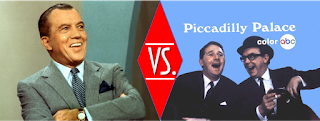 While The Hollywood Palace is on summer break, ABC fills the Saturday night time slot with Piccadilly Palace, a London-based variety show starring the iconic British comedy duo of Eric Morecambe and Ernie Wise. We'll stop in from time to time during the summer months to see who has the best lineup..
While The Hollywood Palace is on summer break, ABC fills the Saturday night time slot with Piccadilly Palace, a London-based variety show starring the iconic British comedy duo of Eric Morecambe and Ernie Wise. We'll stop in from time to time during the summer months to see who has the best lineup..Sullivan: Ed's guests in this rerun are Ginger Rogers; singers Johnny Mathis, the Lovin’ Spoonful and Abbe Lane; comics Jerry Stiller and Anne Meara, and Bob King; the tumbling Three Kims; and puppet Topo Gigio.
Piccadilly: Guests are singer Frankie Avalon and the New Vaudeville Band, with regular Millicent Martin. Hosts Eric Morecambe and Ernie Wise do some wild impressions of Julius Caesar, and Samson and Delilah; and Wise offers an improbable version of Grieg’s Concerto in A Minor. Frankie sings "What Is This Thing Called Love?" and "I Could Write a Book" while the New Vaudevlle Band sings "If I Had a Talking Picture of You" and "Finchley Central." Millicent sings "Window Wishin'"
Piccadilly Palace is just different enough from Ed—the show is centered around the skits of Morecambe and Wise—that the matchups become imprecise. Having said that, I'm no particular fan of either the Lovin' Spoonful or the New Vaudeville Band, and Morecambe and Wise's skits sound ridiculously funny. But Stiller and Meara can be very clever, and with Ginger Rogers and Johnny Mathis, chances are Sullivan takes the week.
l l l
There's a lot of history in this week's programs. Not the kind of history that necessarily shows up in the books, but history all the same. It's something I've stressed since I started this project all these years ago: the idea that TV Guide represents a history book, a pop culture mirror, all kinds of things besides what's on TV tonight.
Here's an example of something that is in the history books, although you might not all be familiar with it. It's the CBS News Special "How Israel Won the War" (Tuesday, 10:00 p.m.), with Mike Wallace leading the look at Israel's devistating victory in what came to be known as the Six-Day War, including interviews with Israeli Defense Minister Moshe Dayan and Army Chief of Staff (and future prime minister) Itzhak Rabin. We've grown used to endless wars, in these last few decades; the idea that a major war could be conducted, and won, in less than a week, is almost hard to imagine.
Tensions in the Middle East were, then as now, at a heightened level, which came to the boiling point when Egyptian president Nassar closed the Straits of Tiran to Israeli shipping, and ordered the UN emergency force out of the area. On June 5, as the UN personel were evacuating, Israel launched a preemptive strike, wiping out Egypt's air defenses and occupying the Sinai Peninsula, the Golan Heights, the West Bank, and the Gaza Strip. Jordan and Syria entered the war on Egypt's side, but a ceasefire was agreed to on June 11. There were more than 20,000 Arab casualties, while Israel suffered fewer than 1,000.* The politics, as well as the ramifications from the war, can be debated, but it created a mystique about the efficiency of the Israeli military that would continue for decades.
*Elsewhere in this issue it is mentioned that Ted Yates, NBC's acclaimed reporter, was killed in Jerusalem during the war.
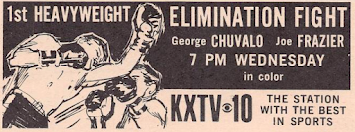 Next we head ringside, for what's being billed as a "heavyweight elimination fight" between George Chuvalo and Joe Frazier, live from Madison Square Garden in New York (Tuesday, 7:00 p.m., syndicated). This refers to the June 20 decision to strip Muhammad Ali of the heavyweight title after he refused draft induction. (Ali was also sentenced to five years in prison for draft evasion, fined $10,000, and banned from boxing for three years. His conviction was overturned by the Supreme Court in 1971.)
Next we head ringside, for what's being billed as a "heavyweight elimination fight" between George Chuvalo and Joe Frazier, live from Madison Square Garden in New York (Tuesday, 7:00 p.m., syndicated). This refers to the June 20 decision to strip Muhammad Ali of the heavyweight title after he refused draft induction. (Ali was also sentenced to five years in prison for draft evasion, fined $10,000, and banned from boxing for three years. His conviction was overturned by the Supreme Court in 1971.) This "elimination fight" business in the ad is a bit misleading; the World Boxing Association did set up a tournament involving the top eight heavyweights, the winner of which would be their new champion. Frazier, however, declined to take part in the tournament, instead continuing to build up his undefeated record, and Tuesday's fight against Chuvalo will be his toughest test yet, one which he'll pass with flying colors by stopping Chuvalo in a fourth-round TKO. It's likely that the only "elimination" aspect of this fight was that whoever lost was out of the running for the time being.
In March 1968, Frazier defeats Buster Mathis in the inaugural event at the new Madison Square Garden to win recognizition by the New York State Athletic Commission (and five other states) as its heavyweight champ. Frazier defeats Jimmy Ellis, the winner of the WBA tournament, in February 1970 to win the undisputed championship; he'll retain that title with an epic victory over the reinstated Ali in March 1971.
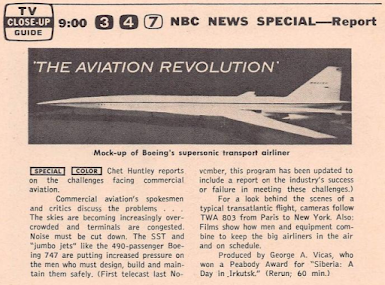 And then, there's the revolution that wasn't. The supersonic transport—SST—was supposed to be one of the great aviation advancements of the 20th century, revolutionizing transatlantic flight. That it wasn't is a fascinating story in and of itself, but in 1967 the promise of the SST is still alive, if not yet functional, and forms a major thread in "The Aviation Revolution," an NBC News Special reported by Chet Huntley. (Wednesday, 9:00 p.m.) The report looks at the challenges facing commercial aviation, including overcrowding skies, increasing noise pollution, and pressure on designers and builders.
And then, there's the revolution that wasn't. The supersonic transport—SST—was supposed to be one of the great aviation advancements of the 20th century, revolutionizing transatlantic flight. That it wasn't is a fascinating story in and of itself, but in 1967 the promise of the SST is still alive, if not yet functional, and forms a major thread in "The Aviation Revolution," an NBC News Special reported by Chet Huntley. (Wednesday, 9:00 p.m.) The report looks at the challenges facing commercial aviation, including overcrowding skies, increasing noise pollution, and pressure on designers and builders.In 1967 the SST is still in the planning stages; the United States, Britain and France, and the Soviet Union are all designing SSTs, with Boeing working on the American version. Controversy continues to dog the plane, though, with concerns about sonic booms and the plane's effect on the ozone layer causing a lengthy and contentious debate that results in Congress killing funding for the SST in 1971, and banning overland commercial supersonic flights over the United States. When the Anglo-French Concorde begins service in the mid-1970s, it's prohibited from flying into New York City, although the ban is eventually overturned. (The Soviet version, the Tupolev Tu-144, began flight in 1975.) Even after environmental concerns are overcome, though, the SST fails to become profitable, and both versions are eventually retired from use. So much for the plane of the future
By the way, here's a footnote for you: In 1967, Boeing was still headquartered in Seattle; when the city was awarded an NBA expansion team (which, ironically, began play in 1967) the team took the name SuperSonics, in tribute to the forthcoming plane. Today, there is no SST, and the Seattle SuperSonics are now the Oklahoma City Thunder. And if you want more irony, the FAA sonic boom tests that so conerned congress were conducted in 1964—in Oklahoma City.
l l l
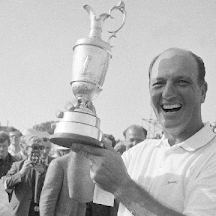 Here's some more sports: the final round of the British Open, telecast live via Early Bird satellite from the Royal Liverpool Golf Club in Hoylake (Saturday, 7:30 a.m., ABC). Unlike major tournaments today, which run from Thursday-Sunday, the Open plays from Wednesday through Saturday, with any playoff round held on Sunday; this schedule lasted until 1980. As for the tournament itself, ◀ Roberto De Vicenzo, whom you may remember from the more unfortunate day when
a scoring error cost him the Masters
, wins the Open by two shots over the defending champion, Jack Nicklaus.
Here's some more sports: the final round of the British Open, telecast live via Early Bird satellite from the Royal Liverpool Golf Club in Hoylake (Saturday, 7:30 a.m., ABC). Unlike major tournaments today, which run from Thursday-Sunday, the Open plays from Wednesday through Saturday, with any playoff round held on Sunday; this schedule lasted until 1980. As for the tournament itself, ◀ Roberto De Vicenzo, whom you may remember from the more unfortunate day when
a scoring error cost him the Masters
, wins the Open by two shots over the defending champion, Jack Nicklaus.Competition of a different kind: the Miss Universe Pageant, live from Miami Beach (Saturday, 10:00 p.m., CBS; tape-delayed in PT). Bob Barker is the host in the Convention Center, June Lockhart hosts the TV broadcast, and singer Jean-Paul Vignon is the musical guest. The winner is Miss USA, Sylvia Hitchcock from Alabama. This is, incidentally, the first time hosting the Miss Universe Pageant for Barker; he'll host both this and the Miss USA pageant through 1987.
A quartet of notable guest stars appear on Thursday's reruns, starting with Daniel Boone (7:30 pm., NBC), which has Jimmy Dean playing a banjo-strumming woodsman on the lam from a murder charge. At the same time over on CBS, Tallulah Bankhead plays herself as Lucy's new neighbor on The Lucy-Desi Comedy Hour; in order to impress her, Lucy tries to talk Fred and Ethel to pose as her maid and butler. Later on, Vincent Price is Count Sforza on F Troop (8:00 p.m., ABC), and the troopers at Fort Courage are convinced that he's a vampire responsible for the disappearance of Wrangler Jane. And finally, Reginald Owen, known to most people here as Ebenezer Scrooge in the 1938 version of A Christmas Carol, guests on Bewitched (8:30 p.m., ABC) as Aunt Clara's boyfriend, Ocky, and he comes along just in time: Clara has just blacked out the entire Eastern Seaboard.
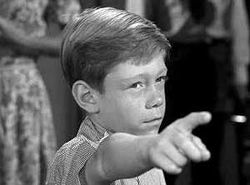 Friday night features a couple of classics on local TV. First, on KHSL in Chico, it's the chilling Twilight Zone episode "It's a Good Life" (7:00 p.m.), in which ►Billy Mumy casts anyone who makes him angry into the cornfield. Later, it's the supurb Twelve Angry Men (9:00 p.m., KXTV in Sacramento), with Henry Fonda single-handedly holding up the dignity of the judicial system. Interesting to note that the description refers to it as "an adaptation of Reginald Rose's TV classic"; for many years, the TV version, which appeared on Studio One and starred Robert Cummings in the Fonda role, was thought lost; it's since been recovered, but I'd imagine that nowadays very few people know about it and think only of the movie version. Personally, I think you could make a case that Cummings dones a better job than Fonda, but that's just me.
Friday night features a couple of classics on local TV. First, on KHSL in Chico, it's the chilling Twilight Zone episode "It's a Good Life" (7:00 p.m.), in which ►Billy Mumy casts anyone who makes him angry into the cornfield. Later, it's the supurb Twelve Angry Men (9:00 p.m., KXTV in Sacramento), with Henry Fonda single-handedly holding up the dignity of the judicial system. Interesting to note that the description refers to it as "an adaptation of Reginald Rose's TV classic"; for many years, the TV version, which appeared on Studio One and starred Robert Cummings in the Fonda role, was thought lost; it's since been recovered, but I'd imagine that nowadays very few people know about it and think only of the movie version. Personally, I think you could make a case that Cummings dones a better job than Fonda, but that's just me.l l l
On Coronet Blue (Monday, 10:00 p.m., CBS), Denholm Elliott and Juliet Mills guest star in a story that features Alden (Frank Converse) caught between a fugitive revolutionary and the gunmen out to get him. Coronet Blue has been the surprise hit of the summer season—but Richard K. Doan warns its fans that they'd better "prepare themselves to be left dangling." You see, the program, which was approved by Jim Aubrey (one of his "last ventures before his fall as CBS-TV czar") for the 1965-66 season. After Aubrey was bounced, his successor, Jack Schneider, "thought it a poor show and shelved it." However, producer Herbert Brodkin, who had a firm contract with the network for 13 shows, went ahead and shot them. This year, CBS decided to burn off the series in order to recoup some of its investment, and scheduled 11 of the 13 episodes for the summer. Without, of course, an explanation of the cryptic storyline. (Even if CBS wanted to continue the show, star Converse had already moved on ( no pun intended ) to N.Y.P.D. on ABC.)
I'm sure many, if not most, of you are familiar with the Coronet Blue debacle, but here's an excellent article at Television Obscurities that goes into detail, including how the mystery was supposed to e wrapped up. You can see it on DVD, and while it may not live up to its mythic status, it's still fun.
l l l
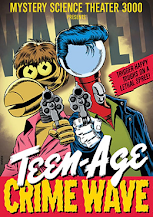 MST3K alert: Teen-Age Crime Wave (1955). Three dangerous juvenile delinquents take refuge in the home of a farmer and his family. Tommy Cook, Mollie McCart, Sue England. (Thursday, 3:300 p.m., KHSL) Let's see, so far we've had Teen-Age Caveman, Teen-Age Strangler, and Teenagers From Outer Space, so I suppose this would be the natural succession. Our three stars are the three teens holding the family hostage, but of course one of them has to be the weak link, allowing the plot to fail. Well, what did you expect—In Cold Blood? And if those actors are teenagers, then I'm Truman Capote. TV
MST3K alert: Teen-Age Crime Wave (1955). Three dangerous juvenile delinquents take refuge in the home of a farmer and his family. Tommy Cook, Mollie McCart, Sue England. (Thursday, 3:300 p.m., KHSL) Let's see, so far we've had Teen-Age Caveman, Teen-Age Strangler, and Teenagers From Outer Space, so I suppose this would be the natural succession. Our three stars are the three teens holding the family hostage, but of course one of them has to be the weak link, allowing the plot to fail. Well, what did you expect—In Cold Blood? And if those actors are teenagers, then I'm Truman Capote. TV
Published on July 15, 2023 05:00
July 14, 2023
Around the dial
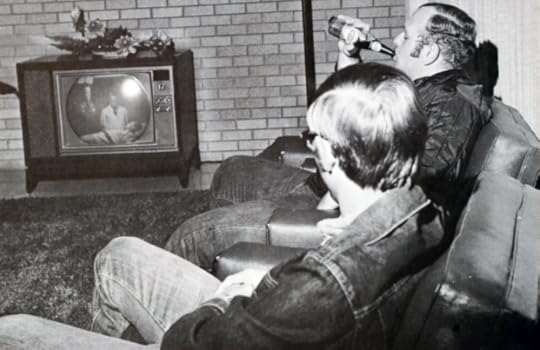
 Most of today's commercials are—what would you say? Odes to crass materialism? Of course, that's always been a part of advertising. But sometimes a commercial can evokes an era long left behind, and at Comfort TV, David looks at one such commercial: the 1977 "
Here's to good friends
" commercial for Löwenbräu. I think you'll know just what David is talking about.
Most of today's commercials are—what would you say? Odes to crass materialism? Of course, that's always been a part of advertising. But sometimes a commercial can evokes an era long left behind, and at Comfort TV, David looks at one such commercial: the 1977 "
Here's to good friends
" commercial for Löwenbräu. I think you'll know just what David is talking about.Christmas has produced more than its share of good times, at least for me, and at Christmas TV History Joanna continues her month-long look at some of those memories created by various adaptations of A Christmas Carol. Next up: Ebenezer , a 1998 Western-themed remake with Jack Palance as a terrific Scrooge.
At bare•bones e-zine, Jack continues the Hitchcock Project with the second of Charlotte Armstrong's scripts for the Alfred Hitchcock Presents: " Sybilla ," a domestic drama with a very big twist, starring Alexander Scorby and Barbara Bel Geddes.
John takes a break from his American Dream and The X-Files series at Cult TV Blog to watch The Man from U.N.C.L.E. and the second-season episode " The Birds and the Bees Affair ," an "insane" story about bees being used as killer weapons. Some of the ideas could have come right out of the CIA handbook. . .
We haven't heard from The Horn Section for awhile, so this week Hal makes up for it with a two-parter from Love That Bob 's final season in 1959: "Bob Helps Martha," and "Bob Helps Von Zell." The great Rose Marie plays Martha in the first episode, while Harry Von Zell appears as himself in the second, as does George Burns.
At Cult TV Lounge, we're up to a fine Tara King episode that I quite enjoyed: " The Interrogators ," with Christopher Lee in terrific form as a sinister British office who may or may not be what he seems. Of course, any episode in which Steed gets to use his armored bowler hat is a guarantee.
Martin Grams has some book reviews for you in you're in the mood for some nice reading material. The five books in question are career bios of Betty White, Carol Lynley, Jeanne Eagels, Barbara Nichols, and Sylvia Sidney. A star and an era for just about anyone, I'd say.
Here's something from last week that I'm catching up on: at Television Obscurities, Robert celebrats "Lost TV Day" with a look at the programming shown on ABC on Thursday, January 12, 1961 . This inclusive article shows just how difficult it can be to accurately research American television. It also shows how such a valuable archive was treated with so little care.
At The View from the Junkyard, Roger reviews the Columbo episode " Murder in Malibu ," one of the "new" Columbo episodes, and a rarity: a truly bad episode, featuring bad acting from almost everyone, a weak twist, and a case against the killer that's "falling apart at the seams, inside-out, back-to-front, and the label is showing." Ouch!
Travlanche celebrates the 110th birthday of Dave Garroway , and talks about his legacy in television history, especially Today. And if there's anyone who can tell you what that legacy is all about, it's my friend Jodie at Garroway at Large, who wrote the book on Dave . Her book, Peace, is a winner for anyone who wants to know more about both Dave Garroway and television history, and you can buy it here .
Finally, a link to my latest appearance on The Dan Schneider Video Interview. It's a real treat this week, as the aforementioned Martin Grams joins us to talk about The Twilight Zone, and I can't think of anyone more qualified to do so. You can view it here . By the way, things have been a bit busy here, so if you've left a comment on the blog and haven't seen a reply yet, I'll be doing those today. TV
Published on July 14, 2023 05:00
July 12, 2023
Burke's Law: the cop show with a heart—or at least wallet—of gold
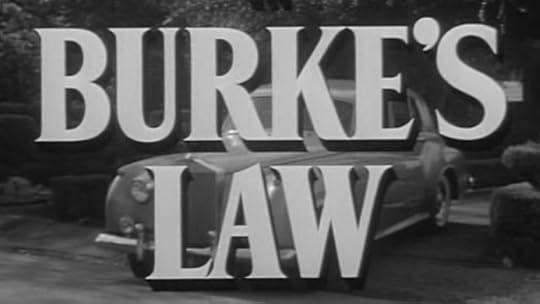
 A badly wanted to do comedy," Gene Barry said in a profile for the November 23, 1963 issue of TV Guide. "I searched the scripts for the inherent comedy that can be found in almost any drama. I searched for the twinkle, the lift of an eyebrow [that] could change the tone of a serious sentence. I read Burke’s Law. I envisioned the twinkle in it."
A badly wanted to do comedy," Gene Barry said in a profile for the November 23, 1963 issue of TV Guide. "I searched the scripts for the inherent comedy that can be found in almost any drama. I searched for the twinkle, the lift of an eyebrow [that] could change the tone of a serious sentence. I read Burke’s Law. I envisioned the twinkle in it."And so, after three seasons as the Western hero Bat Masterson, after having said he would never do another television series, Barry returned to the small screen to portray Amos Burke, millionaire captain of the LAPD homicide division (and eventual secret agent, but we’ll get to that later), in the whimsical mystery that ran on ABC, in two different formats, for a total of three seasons.
When you keep finding new-old programs to watch, you have to be careful not to forget the old-old programs you’ve already enjoyed. It's been close to a decade since we last watched Burke's Law, and so last month we reintroduced it into the Saturday night schedule. Sometimes when you revisit an old favorite, you find your ardor somewhat diminished, but it's not the case here; it's every bit as enjoyable now as it was back then.
I never saw Burke’s Law when it was in first-run. My only recollection of it was from the reruns in syndication in the late-60s, and from that all I can remember is the Rolls Royce tooling down the road while a woman’s voice cooed, "It’s Burke’s Law!" To tell you the truth, that voice kind of scared me a bit. (Of course, I hadn’t yet learned the meaning of the world "sultry.")
Based on the premise alone, it would have been impossible to produce Burke’s Law without that twinkle Barry mentioned. Burke is indeed a millionaire (the source of his money is never definitely stated, though he refers to an inheritance from his father, and implies that he’s multiplied that fortune through shrewd investments*) who lives in a mansion, is often clad in a tuxedo and surrounded by beautiful women, and is chauffeured to crime scenes in a Rolls Royce by his driver/valet, Henry (Leon Lontoc).
*Gene Barry himself was no slouch when it came to investing. That same 1963 TV Guide article mentions Barry’s ownership of a 40-acre orange ranch, mines in Nevada, a half-share of a construction company, and prime land in Los Angeles on which he and his partners planned to put up office buildings and apartments. Substituting Burke for Berry does a pretty good job of filling in the gaps.
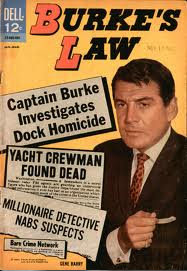 Which, of course, begs the question: why does a man who clearly doesn’t have to work for a living choose a profession that’s not only difficult, but dangerous, one that required him to work his way up the ladder from beat cop to captain of homicide and could claim his life at any moment? I don’t know if Barry was one of those actors who composed backstories for each of the characters he played, but he does drop hints as to his concept of Burke. He is "a carry-over of the Old World, but part of this world," cultured, mannered, sophisticated, worldly. "Police work is as important to Amos Burke as building a building is to me. Hell, he wouldn’t be happy sitting in a stock-exchange seat. He is alive, vital, now." Probably the best answer comes from fellow detective Tim Tilson, who in the premiere episode is asked by a bystander at a crime scene why a millionaire would bother being a cop. "Why are you a construction man?" Tilson counters. "That's what I do best," the man says, to which Tilson replies, "That's why he's a cop."
Which, of course, begs the question: why does a man who clearly doesn’t have to work for a living choose a profession that’s not only difficult, but dangerous, one that required him to work his way up the ladder from beat cop to captain of homicide and could claim his life at any moment? I don’t know if Barry was one of those actors who composed backstories for each of the characters he played, but he does drop hints as to his concept of Burke. He is "a carry-over of the Old World, but part of this world," cultured, mannered, sophisticated, worldly. "Police work is as important to Amos Burke as building a building is to me. Hell, he wouldn’t be happy sitting in a stock-exchange seat. He is alive, vital, now." Probably the best answer comes from fellow detective Tim Tilson, who in the premiere episode is asked by a bystander at a crime scene why a millionaire would bother being a cop. "Why are you a construction man?" Tilson counters. "That's what I do best," the man says, to which Tilson replies, "That's why he's a cop."It's a premise that requires some selling, but Barry is just the man to do it. Producer Aaron Spelling describes him as a man "at home in [a tuxedo], secure in it," and his portrayal of Burke owes much to his previous turn as the Western dandy Masterson. In this updated environment Berry is still a crimefighter, albeit with a gun instead of a walking stick. And, as his colleagues are quick to remind others, a millionaire is what he is, but a policeman is who he is.
Given its various elements, Burke’s Law could have gone in several directions, but its success derives from the direction it chose. Neither traditional police drama nor comedy, each episode is centered on a spectacular murder (with the victim identified by the episode title Who Killed …) and a cast of flamboyantly eccentric (to put it lightly) suspects, mostly played by big-name guest stars (listed in alphabetical order in the opening credits, and frequently making little more than cameo appearances). Given that, one could hardly be blamed for expecting the investigating detectives to be just as zany, but far from it: Burke and his two cohorts, Sergeant Les Hart (veteran actor Regis Toomey) and Detective Tim Tilson (Gary Conway), could have been buffoons or broad caricatures, but instead they’re skilled cops who understand that murder is a deadly business and take their jobs seriously (if not always how they do them). They’re very smart, and very, very good.
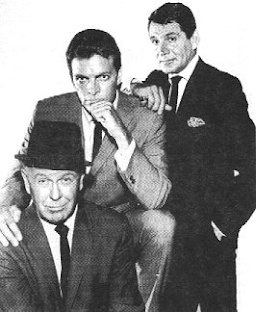 L-R: Regis Toomey, Gary Conway,
L-R: Regis Toomey, Gary Conway, and Gene BarryThe show’s premise also offers Burke an unusual advantage, never overtly stated but often implied, that as a millionaire he has the ability to deal with rich, powerful suspects on an even footing. Their money can’t intimidate him (he’s probably as wealthy as they are), nor can their influence scare him off. He’s beholden to nobody but the public, and he doesn’t scare easily.
The interplay between the three is one of the show’s delights. Hart is the veteran, wizened cop and mentor to the young Tilson, who has an encyclopedic knowledge of almost everything but lacks the experience and intuition to put the pieces together. Burke and Les obviously go back a long way (Les will on occasion drop the formality and refer to Burke as "Amos,"), and while Tim can sometimes be a bit of a showoff, it’s clear that Burke has a paternal affection for the young detective, often imparting a bit of his collected wisdom. ("Never ask a question unless you already know the answer—Burke’s Law.") The three men split up the investigative work, with Burke generally reserving for himself ("Your old Captain") the interrogation of the most interesting suspects. Those suspects are frequently also beautiful women, and their attraction to the handsome, dashing Burke may be genuine—or an attempt to throw him off the trail.
Indeed, Burke is seldom out of the company of an attractive female—the episode often begins with him in the embrace of some such lovely companion—but the moment the phone rings, with Les or Tim calling him to the scene of yet another murder, Burke is all business. The debonair playboy is gone, replaced by the determined homicide captain. There’s never an attempt to avoid his job, just a request to his female companion that she not go away.
And that, I think, is one of the main reasons I find this show so enjoyable. For all of the light touches— and the mix of comedy and drama works surprisingly well—Amos Burke is a policeman before all else, a damn good one who understands the importance of his job. His suspects may include glamorous women, but their beauty never blinds him to the possibility that behind their makeup may be the face of a killer. He’s not afraid to trade either punches or gunshots, and he’s not satisfied until the killer is apprehended.
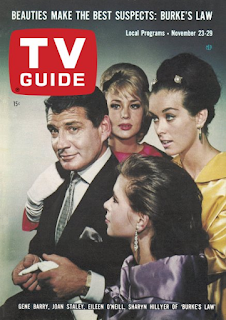 Then there's that twinkle in the eye that Barry talked about, the priceless reactions when Burke meets yet another crazy suspect or has to listen to yet another ridiculous story. It’s when Burke lets us know that it’s a joke, and that we’re in on it. Throw in some great supporting players, such as Michael Fox as the droll medical examiner and Eileen O’Neill as a desk sergeant who doesn’t have to take second place to any of Burke’s beauties, and you’ve got the ingredients for a great show.*
Then there's that twinkle in the eye that Barry talked about, the priceless reactions when Burke meets yet another crazy suspect or has to listen to yet another ridiculous story. It’s when Burke lets us know that it’s a joke, and that we’re in on it. Throw in some great supporting players, such as Michael Fox as the droll medical examiner and Eileen O’Neill as a desk sergeant who doesn’t have to take second place to any of Burke’s beauties, and you’ve got the ingredients for a great show.**And by the way, speaking of beauties, did I mention that Anne Francis’ detective series Honey West was a direct spin-off from Burke? She was introduced in the second-season episode "Who Killed the Jackpot?" and would go on to a one-season run in 1965-66.
Which is why the third and final season is such a disappointment. Caught up in the spy hysteria of the early James Bond years, for 1965 the series changed format completely. Amos Burke was now a secret agent (hence the show’s new title: Amos Burke, Secret Agent), working for a spymaster known only as "The Man" (Carl Benton Reid). It had a flashy opening title and fun gadgets and even more beautiful women, if that was possible. It even had Burke’s Rolls. What it didn’t have was the chemistry of the original. No Les, no Tim, no Henry. It ran for 17 episodes, and by January 1966 it was over.
Apparently, Amos Burke tired of the secret agent business and returned to the LAPD, or at least that’s what had happened in the 1994-95 revival of Burke’s Law. Burke was now a chief, his sidekick was his son Peter (during the intervening years Burke had married and was now a widower), and Henry was back behind the wheel of his Rolls (albeit with a different actor). It was a middling success, running for 24 episodes over two seasons.
Burke’s Law could have been many things. It could have been a comedy, a la Barney Miller or Car 54. It could have been a police procedural, like any one of the cop shows on at the time. Instead, it was a one-of-a-kind, a comedy-mystery, a sophisticated whodunit. Most of all, Burke’s Law was fun. It wasn’t searing drama, it didn’t involve impossibly convoluted plots. It was easy to watch, and easy to enjoy. It has suffered from one of the most frustrating of DVD issues, with the first season coming out in 2008, and nothing since. Fortunately, it has aired on Me-TV in the past (which is where I caught it), and hopefully it will again. It's also available on YouTube—all three seasons, including Amos Burke, Secret Agent. And whether you're watching it for the first time or rekindling an old memory, you'll feel the same way. TV
Published on July 12, 2023 05:00
July 10, 2023
What's on TV? Monday, July 7, 1969

 It's always a good idea every once in awhile to take stock of what shows are making the syndication rounds. Many of the shows now fall into the "classic" category, but back then they were only a few years old: Burke's Law, The Real McCoys, Timmy and Lassie, Leave It to Beaver, Gilligan's Island, I Love Lucy, The Patty Duke Show, McHale's Navy, I Love Lucy, The Untouchables, Perry Mason, and Alfred Hitchcock Presents are all part of this Northern California edition. And there are shows like The Andy Griffith Show and The Dick Van Dyke Show that are still running as daytime shows on CBS. I became familiar with most of these shows when they ran in syndicadtion, and I'll bet many of you did as well. Things have changed with the advent of retro channels, but even so, I suspect that Gilligan, Dick Van Dyke, Andy Griffith, and Lucy are always being shown somewhere in this world.
It's always a good idea every once in awhile to take stock of what shows are making the syndication rounds. Many of the shows now fall into the "classic" category, but back then they were only a few years old: Burke's Law, The Real McCoys, Timmy and Lassie, Leave It to Beaver, Gilligan's Island, I Love Lucy, The Patty Duke Show, McHale's Navy, I Love Lucy, The Untouchables, Perry Mason, and Alfred Hitchcock Presents are all part of this Northern California edition. And there are shows like The Andy Griffith Show and The Dick Van Dyke Show that are still running as daytime shows on CBS. I became familiar with most of these shows when they ran in syndicadtion, and I'll bet many of you did as well. Things have changed with the advent of retro channels, but even so, I suspect that Gilligan, Dick Van Dyke, Andy Griffith, and Lucy are always being shown somewhere in this world.-2- KTVU (BAY AREA) (IND.) MORNING 8:05 NEWS -C- 8:15 RELIGION—Protestant -C- 8:30 JACK LA LANNE—Exercise -C- 9:00 POPEYE—Children -C- 9:30 BEVERLY HILLBILLIES—Comedy -C- 10:00 ANDY GRIFFITH 10:30 BURKE’S LAW—Mystery 11:45 ROMPER ROOM—Children -C- AFTERNOON 12:30 BEAT THE ODDS—Game -C- 1:00 MOVIE—Police “Big House, U.S.A.” (1955) 3:00 LINKLETTER SHOW -C- Guest: Buddy Hackett 3:25 NEWS -C- 3:30 POPEYE—Children -C- 4:00 TIMMY AND LASSIE—Adventure 4:30 LEAVE IT TO BEAVER—Comedy 5:00 DENNIS THE MENACE—Comedy 5:30 PATTY DUKE—Comedy EVENING 6:00 MY FAVORITE MARTIAN 6:30 McHALE’S NAVY—Comedy 7:00 I LOVE LUCY—Comedy 7:30 TWO FOR TRAVEL -C- 8:00 PASSWORD—Game -C- Celebrities: Carol Burnett, Ross Martin 8:30 WHAT’S MY LINE?—Game -C- Celebrities: Joanna Barnes, Arlene Francis, Nipsey Russell, Soupy Sales 9:00 DELLA REESE—Variety -C- 10:00 NEWS—Gary Park -C- 11:00 UNTOUCHABLES—Drama 12:00 ALFRED HITCHCOCK—Drama 1:00 NEWS -C-
-3- KCRA (SACRAMENTO) (NBC) MORNING 6:00 RHYME AND REASON 7:00 TODAY -C- Guests: Joseph Papp, L.H. Whittemore , Stéphane Grappelli 9:00 IT TAKES TWO -C- Guests: Tom Kennedy, Peter Marshall, Dionne Warwick, and their spouses. Host: Vin Scully 9:25 NEWS—Nancy Dickerson -C- 9:30 CONCENTRATION -C- 10:00 PERSONALITY -C- Celebrities: Bob Crane, Vivian Vance, Gwen Verdon. On-film: Gypsy Rose Lee 10:30 HOLLYWOOD SQUARES—Game -C- Guests: Jack Cassidy, Nanette Fabray, Sally Ann Howes, Meredith MacRae, Jan Murray. Regulars: Wally Cox, Abby Dalton, Paul Lynde, Charley Weaver 11:00 JEOPARDY—Game -C- 11:30 EYE GUESS—Game -C- 11:55 NEWS—Edwin Newman -C- AFTERNOON 12:00 NEWS -C- 12:30 DAYS OF OUR LIVES -C- 1:00 DOCTORS—Serial -C- 1:30 ANOTHER WORLD -C- 2:00 YOU DON’T SAY!—Game -C- Guests: Frankie Avalon, Shani Wallis 2:30 MOVIE—Western “Al Jennings of Oklahoma” (1951) 4:00 FLINTSTONES -C- 4:30 LEAVE IT TO BEAVER—Comedy 5:00 TRAVENTURE THEATRE -C- EVENING 6:00 NEWS—Chet Huntley/David Brinkley -C- 6:30 NEWS—Whitten/Jarvis -C- 7:30 I DREAM OF JEANNIE -C- 8:00 LAUGH-IN -C- Guest: Peter Lawford 9:00 MOVIE—Musical Biography “The Jolson Story” (1946) 11:00 NEWS -C- 11:30 JOHNNY CARSON -C- Guest host: Flip Wilson 1:00 NEWS -C-
-4- KRON (BAY AREA) (NBC) MORNING 6:30 NEWS—Dick Doughty -C- 7:00 TODAY -C- Guests: Joseph Papp, L.H. Whittemore , Stéphane Grappelli 9:00 IT TAKES TWO -C- Guests: Tom Kennedy, Peter Marshall, Dionne Warwick, and their spouses. Host: Vin Scully 9:25 NEWS—Nancy Dickerson -C- 9:30 CONCENTRATION -C- 10:00 PERSONALITY -C- Celebrities: Bob Crane, Vivian Vance, Gwen Verdon. On-film: Gypsy Rose Lee 10:30 HOLLYWOOD SQUARES—Game -C- Guests: Jack Cassidy, Nanette Fabray, Sally Ann Howes, Meredith MacRae, Jan Murray. Regulars: Wally Cox, Abby Dalton, Paul Lynde, Charley Weaver 11:00 JEOPARDY—Game -C- 11:30 EYE GUESS—Game -C- 11:55 NEWS—Edwin Newman -C- AFTERNOON 12:00 NEWS -C- 12:30 DAYS OF OUR LIVES -C- 1:00 DOCTORS—Serial -C- 1:30 ANOTHER WORLD -C- 2:00 YOU DON’T SAY!—Game -C- Guests: Frankie Avalon, Shani Wallis 2:30 MATCH GAME -C- Guests: Bennett Cerf, Joanne Carson 2:55 NEWS—Floyd Kalber -C- 3:00 YOU’RE PUTTING ME ON -C- 3:30 REAL McCOYS—Comedy 4:00 FLINTSTONES -C- 4:30 CARTOONS—Children -C- 4:45 LOST IN SPACE 5:45 NEWS—Frank Dill -C- EVENING 6:00 NEWS -C- 6:30 NEWS—Chet Huntley/David Brinkley -C- 7:00 ASSIGNMENT FOUR -C- 7:30 I DREAM OF JEANNIE -C- 8:00 LAUGH-IN -C- Guest: Peter Lawford 9:00 MOVIE—Drama -C- “Trial Run” (1968) 11:00 NEWS -C- 11:30 JOHNNY CARSON -C- Guest host: Flip Wilson 1:00 JOAN RIVERS -C- Guest: Diana Sands 1:30 NEWS -C-
-5- KPIX (BAY AREA) (CBS) MORNING 6:00 BLACK HERITAGE—History -C- 6:30 CITIES IN CONFLICT 7:00 NEWS—Joseph Benti -C- 7:30 NEWS—Ron Magers 8:00 CAPTAIN KANGAROO -C- 9:00 LUCILLE BALL -C- 9:30 HOTLINE—Discussion -C- 10:30 DICK VAN DYKE 11:00 LOVE OF LIFE -C- 11:25 NEWS -C- 11:30 SEARCH FOR TOMORROW -C- AFTERNOON 12:00 NEWS -C- 12:30 AS THE WORLD TURNS—Serial -C- 1:00 LOVE IS A MANY-SPLENDORED THING—Serial -C- 1:30 GUIDING LIGHT -C- 2:00 SECRET STORM -C- 2:30 EDGE OF NIGHT -C- 3:00 MIKE DOUGLAS—Variety -C- Co-host: Joey Heatherton. Guests include Rodney Dangerfield 4:30 DAVID FROST—Variety -C- Debut: Guests: Prince Charles, Ed Sullivan EVENING 6:00 NEWS -C- 6:30 NEWS—Walter Cronkite -C- 7:00 NEWS—John Weston -C- 7:30 GUNSMOKE -C- 8:30 SMOKING—Report -C- Special 9:00 MAYBERRY R.F.D. -C- 9:30 FAMILY AFFAIR -C- 10:00 JIMMIE RODGERS -C- Guest: Carol Burnett 11:00 NEWS -C- 11:30 PERRY MASON—Mystery
-6- KVIE (SACRAMENTO) (NET) AFTERNOON 5:45 FRIENDLY GIANT—Children EVENING 6:00 MISTEROGERS—Children 6:30 WHAT’S NEW—Children 7:00 MISTEROGERS—Children 7:30 EASTERN WISDOM 8:00 WORLD PRESS—Report -C- 9:00 NET JOURNAL -C- “The World of Piri Thomas” 10:00 NET PLAYHOUSE—Drama “A Man on Her Back” [After the play: “Lines and Dots” blends surrealism and animation to depict a destructive society.]
-7- KGO (BAY AREA) (ABC) MORNING 6:00 NAVY STORY 6:25 A.M.—Jim Dunbar -C- 8:30 GIRL TALK—Interviews -C- Guests: Adele Friedrichs, Terese Von Zitter. Host: Betsy Palmer 9:00 MOVIE—Drama “Count Three and Pray” (1955) 11:00 ANNIVERSARY GAME -C- 11:30 GALLOPING GOURMET -C- AFTERNOON 12:00 BEWITCHED—Comedy 12:30 THAT GIRL—Comedy -C- 1:00 DREAM HOUSE -C- 1:30 LET’S MAKE A DEAL -C- 2:00 NEWLYWED GAME -C- 2:30 DATING GAME -C- 3:00 GENERAL HOSPITAL -C- 3:30 ONE LIFE TO LIVE -C- 4:00 DARK SHADOWS -C- 4:30 MOVIE—Musical -C- “Say One for Me” (1959) EVENING 6:00 NEWS -C- 7:00 NEWS—Frank Reynolds/Howard K. Smith -C- 7:30 SUMMER FOCUS -C- Special: “Operation Breadbasket” [Pre-empted: “The Avengers”] 8:30 GUNS OF WILL SONNETT -C- 9:00 OUTCASTS—Western -C- 10:00 DICK CAVETT—Variety -C- Guests: Garson Kanin, Gwen Verdon 11:00 NEWS -C- 11:30 JOEY BISHOP -C- Guests: Dana Valery, the Association
7W KRCR (REDDING) (ABC, NBC) MORNING 7:00 TODAY -C- Guests: Joseph Papp, L.H. Whittemore , Stéphane Grappelli 9:00 IT TAKES TWO -C- Guests: Tom Kennedy, Peter Marshall, Dionne Warwick, and their spouses. Host: Vin Scully 9:25 NEWS—Nancy Dickerson -C- 9:30 CONCENTRATION -C- 10:00 PERSONALITY -C- Celebrities: Bob Crane, Vivian Vance, Gwen Verdon. On-film: Gypsy Rose Lee 10:30 HOLLYWOOD SQUARES—Game -C- Guests: Jack Cassidy, Nanette Fabray, Sally Ann Howes, Meredith MacRae, Jan Murray. Regulars: Wally Cox, Abby Dalton, Paul Lynde, Charley Weaver 11:00 JEOPARDY—Game -C- 11:30 EYE GUESS—Game -C- 11:55 NEWS—Reeter -C- AFTERNOON 12:00 YOU’RE PUTTING ME ON -C- 12:30 DAYS OF OUR LIVES -C- 1:00 DREAM HOUSE -C- 1:30 ANOTHER WORLD -C- 2:00 NEWLYWED GAME -C- 2:30 DATING GAME -C- 3:00 GENERAL HOSPITAL -C- 3:30 ONE LIFE TO LIVE -C- 4:00 DARK SHADOWS -C- 4:30 LET’S MAKE A DEAL—Game 5:00 BEWITCHED—Comedy 5:30 NEWS -C- EVENING 6:30 NEWS—Chet Huntley/David Brinkley -C- 7:00 JOHN DAVIDSON—Variety -C- Guest: O.C. Smith 8:00 LAUGH-IN -C- Guest: Peter Lawford 9:00 MOVIE—Drama -C- “Trial Run” (1968) 11:00 NEWS -C- 11:30 JOHNNY CARSON -C- Guest host: Flip Wilson
9W KIXE (REDDING) (NET) AFTERNOON 5:30 WHAT’S NEW—Children EVENING 6:00 MISTEROGERS—Children 6:30 CHALLENGE—Science 7:00 MORE ROOM FOR LIVING 7:30 EASTERN WISDOM 8:00 WORLD PRESS—Report 9:00 NET JOURNAL “The World of Piri Thomas” 10:00 TEENAGERS AND SEX 10:30 ART AND ARTISTS
10 KXTV (SACRAMENTO) (CBS) MORNING 6:00 LIVING WORD—Religion -C- 6:15 INDUSTRY ON PARADE 6:30 BLACK HERITAGE—History -C- 7:00 NEWS—Joseph Benti -C- 8:00 CAPTAIN KANGAROO -C- 9:00 LUCILLE BALL -C- 9:30 BEVERLY HILLBILLIES—Comedy -C- 10:00 ANDY GRIFFITH 10:30 DICK VAN DYKE 11:00 LOVE OF LIFE -C- 11:25 NEWS -C- 11:30 SEARCH FOR TOMORROW -C- AFTERNOON 12:00 NEWS -C- 12:30 AS THE WORLD TURNS—Serial -C- 1:00 LOVE IS A MANY-SPLENDORED THING—Serial -C- 1:30 GUIDING LIGHT -C- 2:00 SECRET STORM -C- 2:30 EDGE OF NIGHT -C- 3:00 LINKLETTER SHOW -C- Guest: Buddy Hackett 3:25 NEWS -C- 3:30 PASSWORD—Game -C- Celebrities: Martin Landau, Elizabeth Montgomery 4:00 MIKE DOUGLAS—Variety -C- Co-host: Joey Heatherton. Guests include Rodney Dangerfield 5:30 NEWS—Walter Cronkite -C- EVENING 6:00 NEWS -C- 7:00 WHAT’S MY LINE?—Game -C- Celebrities: Bert Convy, Arlene Francis, Phyllis Newman, Soupy Sales. Host: Wally Bruner 7:30 GUNSMOKE -C- 8:30 LUCILLE BALL—Comedy -C- 9:00 MAYBERRY R.F.D. -C- 9:30 FAMILY AFFAIR -C- 10:00 JIMMIE RODGERS -C- Guest: Carol Burnett 11:00 NEWS -C- 11:30 MOVIE—Drama “Hotel Berlin” (1945)
12 KHSL (CHICO) (ABC, CBS) MORNING 6:30 FILM -C- 7:00 NEWS—Joseph Benti -C- 8:00 CAPTAIN KANGAROO -C- 9:00 LUCILLE BALL -C- 9:30 BEVERLY HILLBILLIES—Comedy -C- 10:00 ANDY GRIFFITH 10:30 DICK VAN DYKE 11:00 LOVE OF LIFE -C- 11:25 NEWS -C- 11:30 SEARCH FOR TOMORROW -C- AFTERNOON 12:00 PDQ—Game -C- Celebrities: Dick Patterson, Robert Clary, Judy Carne 12:30 AS THE WORLD TURNS—Serial -C- 1:00 LOVE IS A MANY-SPLENDORED THING—Serial -C- 1:30 GUIDING LIGHT -C- 2:00 SECRET STORM -C- 2:30 EDGE OF NIGHT -C- 3:00 LINKLETTER SHOW -C- Guest: Buddy Hackett 3:25 NEWS C 3:30 MIKE DOUGLAS—Variety -C- Guests: James Brown, Morey Amsterdam 4:30 MERV GRIFFIN—Variety -C- Guests: David Frost, Selma Diamond, Mary Hopkins 5:30 NEWS -C- EVENING 6:30 NEWS—Walter Cronkite -C- 7:00 GET SMART—Comedy -C- 7:30 GUNSMOKE -C- 8:30 LUCILLE BALL—Comedy -C- 9:00 MAYBERRY R.F.D. -C- 9:30 FAMILY AFFAIR -C- 10:00 JIMMIE RODGERS -C- Guest: Carol Burnett 11:00 NEWS -C- 11:30 JOEY BISHOP -C- Guests: Dana Valery, the Association
13 KOVR (SAC) (ABC) MORNING 6:25 NEWS -C- 6:30 JACK LA LANNE—Exercise -C- 7:00 AGRICULTURE TODAY -C- 7:15 NEWS—Chuck Rossie -C- 7:20 CARTOONLAND -C- 8:20 CASPER—Children 8:50 JACK LA LANNE—Exercise -C- 9:00 JACK LA LANNE—Exercise -C- 9:20 FASHIONS IN SEWING -C- 9:30 MOVIE—Drama “The True Story of Lynn Stuart” (1958) 11:00 TRUTH OR CONSEQUENCES -C- 11:30 GALLOPING GOURMET -C- Golden Mountain Lambrolls AFTERNOON 12:00 BEWITCHED—Comedy 12:30 THAT GIRL—Comedy -C- 1:00 DREAM HOUSE -C- 1:30 LET’S MAKE A DEAL -C- 2:00 NEWLYWED GAME -C- 2:30 DIVORCE COURT—Drama -C- 3:00 GENERAL HOSPITAL -C- 3:30 ONE LIFE TO LIVE -C- 4:00 DARK SHADOWS -C- 4:30 GILLIGAN’S ISLAND -C- 5:00 I LOVE LUCY—Comedy 5:30 NEWS—Frank Reynolds/Howard K. Smith -C- EVENING 6:00 NEWS -C- 6:30 PERRY MASON—Mystery 7:30 SUMMER FOCUS -C- Special: “Operation Breadbasket” [Pre-empted: “The Avengers”] 8:30 GUNS OF WILL SONNETT -C- 9:00 OUTCASTS—Western -C- 10:00 DICK CAVETT—Variety -C- Guests: Garson Kanin, Gwen Verdon 11:00 NEWS -C- 11:30 JOEY BISHOP -C- Guests: Dana Valery, the Association 1:00 NEWS -C-
19 KLOC (MODESTO) (Ind.) AFTERNOON 5:00 BIG PICTURE—Army 5:30 HOKEY POKEY—Children EVENING 6:00 CHESTER SMITH—Variety 7:00 KLOC AUCTION 8:00 AMERICA SINGS—Gospel Music 8:30 MOVIE—Drama “The Goddess” (1958) 10:00 DAVID TERRELL
40 KTXL (SACRAMENTO) (Ind.) MORNING 11:00 ROMPER ROOM—Children AFTERNOON 12:00 YOU’RE PUTTING ME ON -C- 12:30 MOVIE—Mystery “The Blue Gardenia” (1953) 2:00 PATTY DUKE—Comedy 2:30 MATCH GAME -C- Guests: Bennett Cerf, Joanne Carson 2:55 NEWS—Floyd Kalber -C- 3:00 CAPN’S LOCKER—Children -C- 4:00 POPEYE—Children 4:30 LITTLE RASCALS—Children 5:00 MUNSTERS—Comedy 5:30 MY FAVORITE MARTIAN -C- EVENING 6:00 MOVIE—Drama “The Big Boss” (1941) 7:30 DONALD O’CONNOR -C- Guests: Linda Cristal, Allen Ludden, Ruta Lee, Jonathan Moore, Paul Hampton 8:55 NEWS—Kline -C- 9:00 MOVIE—Drama -C- “Trial Run” (1968) 11:00 MOVIE—Drama “Angel Face” (1953)
TV
Published on July 10, 2023 05:00
July 8, 2023
This week in TV Guide: July 5, 1969
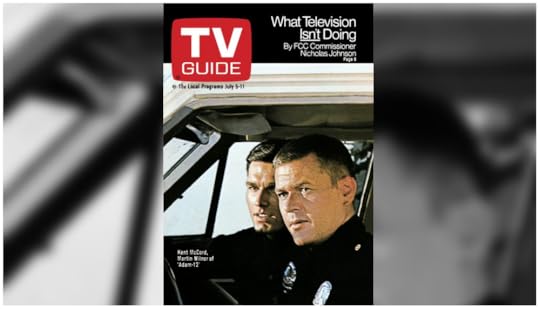
 Like many of you, I rue the day when "fake news" entered the vocabulary. It may have been a good idea at the time, but that time is long past, and the term has been so overused, so distorted, that it no longer means anything at all. But whether or not there is such a thing as "fake news," the idea that we're not getting all the news, all the time, isn't a new one. This week's lead article comes from Nicholas Johnson, an FCC commissioner who agrees with network heads that censorship is a serious problem in America, but he adds that the problem doesn't come from the government, but from the networks themselves.
Like many of you, I rue the day when "fake news" entered the vocabulary. It may have been a good idea at the time, but that time is long past, and the term has been so overused, so distorted, that it no longer means anything at all. But whether or not there is such a thing as "fake news," the idea that we're not getting all the news, all the time, isn't a new one. This week's lead article comes from Nicholas Johnson, an FCC commissioner who agrees with network heads that censorship is a serious problem in America, but he adds that the problem doesn't come from the government, but from the networks themselves.Johnson, who was appointed to the FCC by Lyndon Johnson and will be reappointed by Richard Nixon, offers several examples: NBC cutting off Robert Montgomery when, during a discussion with Johnny Carson on Tonight, he mentioned a CBS station being investigated by the FCC; Joan Baez being prevented from giving her political views while on The Smothers Brothers Show; and the subsequent cancellation of that show. "Sure, there's censorship," Johnson says. "But let's not be fooled into mistaking its source." Network officials, he writes, "are keeping off your television screens anything they find inconsistent with their corporate profits or personal philosophies."
The success of the American experiment, Johnson says, is "the concept of an educated and informed people." Today, that information comes from three networks and two wire services, and these broadcasters "are fighting, not for free speech, but for profitable speech." Case in point: a Febuary 10, 1966 Senate hearing on the Vietnam War. "Fred Friendly, who was president of CBS News at the time, wanted you to be able to watch those hearings. His network management did not permit you to watch. If you were watching CBS that day you saw, instead of George Kennan’s views opposing the Vietnam war, the fifth CBS rerun of I Love Lucy." Friendly quit CBS over the matter; his subsequent book, Due to Circumstances Beyond Our Control, begins with the quote, "What the American people don't know can kill them."
Johnson accuses the media of being in thrall to the big corporate dollars that sponsor their programs. The tobacco industry spends about $250 million a year on radio and television commercials, but "the broadcasting industry has been less than eager to tell you about the health hazards of cigarette smoking." The auto industry spent more than $361 million on advertising in 1964 alone, but the media was silent when it came to the 50,000 highway deaths yearly, virtually "all" of which could have been saved if cars were designed properly. Television news basically ignored recent Senate hearings on truth in food packaging—is it a coincidence that 52.3 percent of TV's total advertising comes from the top-50 grocery-products advertisers? And as for the "law and order" refrain that's swept the news, who knew that much of that crime is of the white-collar variety? "A single recent price-fixing case involved a 'robbery' from the American people of more money than was taken in all the country's robberies, burglaries and larcenies during the years of that criminal price fixing."
And there's more: Black lung disease is on the rise, the life expectancy of the average adult American male is going down, natural-gas pipelines are exploding, color television sets are emitting excess X-ray radiation. Says Johnson, "Note what each of these items has in common: (1) human death, disease, dismemberment or degradation, (2) great profit for manufacturers, advertisers and broadcasters, and (3) the deliberate withholding of needed information from the public."
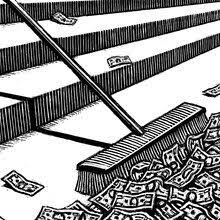 Paraphrasing Bob Dylan, Johnson says that "The 'Silent Screen' of television has left you in ignorance as to what it's all about." And unless and until the media allow all viewpoints to be heard, popular as well as unpopular, there can be no true freedom; as a recent Supreme Court decision declared, "Freedom of the press from governmental interference under the First Amendment does not sanction repression of that freedom by private interests."
Paraphrasing Bob Dylan, Johnson says that "The 'Silent Screen' of television has left you in ignorance as to what it's all about." And unless and until the media allow all viewpoints to be heard, popular as well as unpopular, there can be no true freedom; as a recent Supreme Court decision declared, "Freedom of the press from governmental interference under the First Amendment does not sanction repression of that freedom by private interests."(By the way, pharmaceutical companies paid out $1.68 billion on ad campaigns last year. Just thought you'd like to know that.)
Johnson admits that there are no easy answers, but as an FCC commisioner, he feels as if someone has to speak about these issues. "And all I’m urging is that, when in doubt, all of us —audience, networks and Government —ought to listen a little more carefully to the talented voices of those who are crying out to be heard." "I would far rather leave the heady responsibility for the inventory in America’s 'marketplace of ideas' to talented and uncensored individuals—creative writers, performers and journalists from all sections of this great country—than to the committees of frightened financiers in New York City. Wouldn’t you? I think so." He's glad, he concludes, that the networks have raised the issue of censorship. "I hope they will permit us to discuss it fully."
l l l
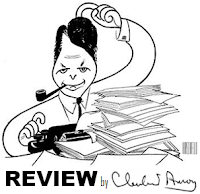 Throughout the 60s and early 70s, TV Guide's weekly reviews were written by the witty and acerbic Cleveland Amory. Whenever we get the chance, we'll look at Cleve's latest take on the shows of the era.
Throughout the 60s and early 70s, TV Guide's weekly reviews were written by the witty and acerbic Cleveland Amory. Whenever we get the chance, we'll look at Cleve's latest take on the shows of the era. This week, Cleveland Amory presents his annual Amory Awards for the best in television over the past year. There isn't anything particuarly clever or witty about them, just a straightforward recitation of the winners—or co-winners, as Amory borrows heavily from the year's Acadamy Awards, which saw a tie for Best Actress between Katharine Hepburn and Barbra Streisand. (Talk about the devil and the deep blue sea.)
At any rate, since it's the bon mots that we usually tune in for, I'm afraid this is going to be rather dull, except as an indicator of what shows were really big back then. And some are good reminders of shows we don't talk about often here, for instance the co-best comedies, The Ghost and Mrs. Muir and Julia, each of which won additional awards as well: Mrs. Muir's Hope Lange and Julia's Diahann Carroll share best actress in a comedy, while Edward Mulhare wins best actor in a comedy, and Lloyd Nolan takes best supporting actor in a comedy. Raymond Burr of Ironside is best actor in a drama, while his co-star Barbara Anderson shares best actress with Mission: Impossible's Barbara Bain. The supporting actor and actress drama awards go to Leonard Nimoy (Star Trek) and Joan Blondell (Here Come the Brides), and the comedy supporting actress is Kay Medford of That's Life. The rest of the best show winners are shared as well; drama belongs to Ironside and Mission: Impossible, the musical-variety winners are This Is Tom Jones and The Glen Campbell Goodtime Hour, and the talk-show host winners are Art Linkletter and Dick Cavett.
There are a lot of winners here, to be sure; either Cleve couldn't make up his mind, or he was really milking that joke about co-winners—milking it a little too much, if you ask me. But then, not every column can be a winner, or even a co-winner, can it?
l l l
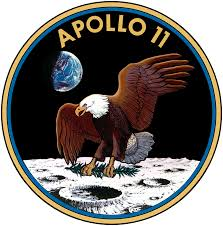 America's got moon fever, baby! The Apollo 11 launch is scheduled for next week, and TV's gearing up for coverage of the great adventure with a handful of specials. On Sunday, The 21st Century (4:00 p.m. PT, CBS), has "Stranger Than Science Fiction," a look at how yesterday's sci-fi compares to today's reality, including movie depictions of space travel. One of those movies may well be First Men in the Moon (Wednesday, 9:00 p.m., KOVR in Sacramento), based on H.G. Wells' classic about a trip to the moon in 1899. NET has a pair of science-orieted programs: Tuesday, John Fitch's Science Reporter (11:30 p.m., NET) welcomes Dr. Wernher von Braun, director of the Space Flight Center in Huntsville, Alabama, who discusses space flights beyond the Apollo program. That's followed on Wednesday by Moon Research (10:00 p.m.) with Nobel Prize winner Harold Urey, one of the scientists who'll be evaluating the lunar samples brought back by the astronauts. NBC's Today Show has reports scheduled for Wednesday, Thursday and Friday mornings (7:00 a.m.) And maybe it's just a coincidence, but the KTXL (Sacramento) movie on Tuesday night is Dangerous Moonlight. (11:00 p.m.) It has nothing to do with space travel, but doesn't the title fit in well? By the way, if you want to see what television did with the epic flight, we covered that
here
.
America's got moon fever, baby! The Apollo 11 launch is scheduled for next week, and TV's gearing up for coverage of the great adventure with a handful of specials. On Sunday, The 21st Century (4:00 p.m. PT, CBS), has "Stranger Than Science Fiction," a look at how yesterday's sci-fi compares to today's reality, including movie depictions of space travel. One of those movies may well be First Men in the Moon (Wednesday, 9:00 p.m., KOVR in Sacramento), based on H.G. Wells' classic about a trip to the moon in 1899. NET has a pair of science-orieted programs: Tuesday, John Fitch's Science Reporter (11:30 p.m., NET) welcomes Dr. Wernher von Braun, director of the Space Flight Center in Huntsville, Alabama, who discusses space flights beyond the Apollo program. That's followed on Wednesday by Moon Research (10:00 p.m.) with Nobel Prize winner Harold Urey, one of the scientists who'll be evaluating the lunar samples brought back by the astronauts. NBC's Today Show has reports scheduled for Wednesday, Thursday and Friday mornings (7:00 a.m.) And maybe it's just a coincidence, but the KTXL (Sacramento) movie on Tuesday night is Dangerous Moonlight. (11:00 p.m.) It has nothing to do with space travel, but doesn't the title fit in well? By the way, if you want to see what television did with the epic flight, we covered that
here
.The Apollo pre-coverage highlights a week that also includes the Wimbledon tennis finals (Saturday, 9:30 a.m. and 2:00 p.m., NBC). The early program is same-day coverage of the men's final, in which defending champion Rod Laver defeats fellow Australian John Newcombe for his fourth Wimbleton title. Laver is on his way to winning the Grand Slam for a second time, the only man to do so; no man has done it since. The afternoon coverage features the women's final, which was played Friday afternoon; Brit Ann Jones upsets American Billie Jean King in the final to become the first British champion since 1961. Incidentally, TV Guide refers to this as the "Wimbledon Open," which sounds cumbersome (as well as incorrect), but it's probably done to specify that this is the second Wimbledon open to professionals as well as amateurs; pro players on both the men's and women's side were banned from the Grand Slam championships until 1968.
A few other shows of varied interest: Meet the Press (Sunday, 1:00 p.m., NBC), with guests Senators George McGovern (D-SD) and Harold Hughes (D-IA). Why it's interesting: the two chair the Democratic Committee on Party Structure and Delegate Selection. Thanks to their liberalization of the delegate selection process, including more women and minorities, Senator McGovern is able to capture the 1972 Democratic presidential nomination, becoming the sacrificial goat to Richard Nixon's landslide victory.
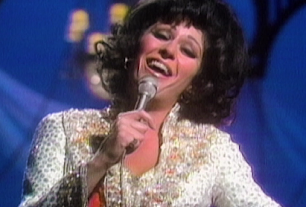 The Ed Sullivan Show (Sunday, 8:00 p.m., CBS). Tonight, Ed's guests are Gordon MacRae, Lainie Kazan (right), comies Jackie Vernon and Charlie Manna, singer Bobby Vinton, the Sugar Shoppe, magician Al Koran, and Valente and Valente, balancing act. Why it's interesting: The Hollywood Palace is off for the summer, replaced by Johnny Cash, so this was our only chance to see what Ed has in store; pretty good lineup, I think.Star Trek (Tuesday, 7:00 p.m., NBC), in which a beautiful woman removes Spock's brain from his skull. Why it's interesting: It isn't, which is what makes it unusual. "Spock's Brain" is generally considered by many Trekkers as one of, if not the, worst episode of the series.NET Playhouse (Thursday, 7:00 p.m., NET) presents "Trapped," the story of a young man whose brushes with the law work against him when he's accused of a murder he didn't commit. Why it's interesting: It's written by Georges Simenon, creator of the famed Inspector Maigret stories, although Maigret does not feature in this, one of Simenon's "psychological dramas."Dead Ringer (Thursday, 9:00 p.m., CBS), starring Bette Davis in a dual role; she kills her twin sister, only to find out that sis's lush life is more dangerous than she thought. Why it's interesting: Judith Crist praises Davis, who "gives her all, in doubles yet." It's also an example of an increasingly rare occurrence on prime-time network television: a black-and-white movie.
The Ed Sullivan Show (Sunday, 8:00 p.m., CBS). Tonight, Ed's guests are Gordon MacRae, Lainie Kazan (right), comies Jackie Vernon and Charlie Manna, singer Bobby Vinton, the Sugar Shoppe, magician Al Koran, and Valente and Valente, balancing act. Why it's interesting: The Hollywood Palace is off for the summer, replaced by Johnny Cash, so this was our only chance to see what Ed has in store; pretty good lineup, I think.Star Trek (Tuesday, 7:00 p.m., NBC), in which a beautiful woman removes Spock's brain from his skull. Why it's interesting: It isn't, which is what makes it unusual. "Spock's Brain" is generally considered by many Trekkers as one of, if not the, worst episode of the series.NET Playhouse (Thursday, 7:00 p.m., NET) presents "Trapped," the story of a young man whose brushes with the law work against him when he's accused of a murder he didn't commit. Why it's interesting: It's written by Georges Simenon, creator of the famed Inspector Maigret stories, although Maigret does not feature in this, one of Simenon's "psychological dramas."Dead Ringer (Thursday, 9:00 p.m., CBS), starring Bette Davis in a dual role; she kills her twin sister, only to find out that sis's lush life is more dangerous than she thought. Why it's interesting: Judith Crist praises Davis, who "gives her all, in doubles yet." It's also an example of an increasingly rare occurrence on prime-time network television: a black-and-white movie.l l l
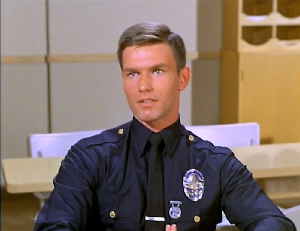 Kent McCord is the cover story this week, and he talks with Burt Prelutsky about how his attitudes toward the police have evolved since he started on Adam-12. He should have been excited, he acknowledges, to co-star in a TV series at the ripe young age of 26, a series with a good chance for success, created by one legendary television figure (Jack Webb) and co-starring another (Martin Milner), but he still wasn't happy. "I just don't like cops," McCord says. "I never had much trouble with them—just the usual kid-cop experiences, like being stopped and being asked where I was going—but they always seemed to be rousting peole for no good reason. They never seemed to be there when you wanted them, and always around when you didn't want 'em."
Kent McCord is the cover story this week, and he talks with Burt Prelutsky about how his attitudes toward the police have evolved since he started on Adam-12. He should have been excited, he acknowledges, to co-star in a TV series at the ripe young age of 26, a series with a good chance for success, created by one legendary television figure (Jack Webb) and co-starring another (Martin Milner), but he still wasn't happy. "I just don't like cops," McCord says. "I never had much trouble with them—just the usual kid-cop experiences, like being stopped and being asked where I was going—but they always seemed to be rousting peole for no good reason. They never seemed to be there when you wanted them, and always around when you didn't want 'em."Things started to change when, according to McCord, he and Milner did some on-the-job training with real LAPD officers to get the hang of things. "I spent 14 nights riding around in a prowl car with a young officer named Mike Watters. It changed my attitude. I got to see the other side of the picture. You see, I had real qualms about glamorizing cops on the show, but riding around on patrol that way helped me get over that. A policeman, you discover, has to put up with a hell of a lot of abuse. A man in any other line of work would nail a guy who laid that kind of abuse on him. I know I would." Watters remembers how it went. "[O]on the second night we went out on a drunk call, and the drunk tried to kick Kent in the face. I think that's when his attitude started to change—when he began to really see what we're up against," he recounts. "I started to think of him as a partner, who'd do what he could to protect me—even though he didn’t carry a firearm."
McCord's connection with the show goes back to his appearance in the Dragnet revival, a set-piece story involving only Webb, Harry Morgan, and McCord. His performance was not forgotten ; says producer R.A. (Bob) Cinader, "When it came to casting Adam-12, it took us 10 seconds to make our decision. Jack had a real thing about Kent." McCord, says Webb, "has all the attributes of a big star." Working on Adam-12 has been an eye-opener for McCord in more ways than one, as Milner points out. "Kent's come a long way this season. He’s much looser now than he was in the beginning. You have to realize that he’s probably done more acting this year than he did in his entire career up to this show."
He's frustrated by the slow development of his character Jim Reed—he'd like him to be more active, reflect more self-assurance—but officers tell him he's doing it just right, that it's the way they were when they were rookies. He's glad that the show is starting to show things like it really happens out there, and adds, "I think it's a mistake that we don't have more violence in the show." And he admits he's still a bit reluctant to be seen as an advertisement for the police; he knows that his performance has made younger people consider law enforcement as a career when they might not otherwise have done so. "I don’t want to be a propagandist for anything but my own feelings, and, hell, I don’t want to be a cop. But I’m an actor and it’s just a job."
Kent McCord goes on to a long career in television and movies, and almost wound up playing a police officer one more time; Jack Webb was planning to make Jim Reed Joe Friday's partner in a new Dragnet series, but died before the series went into production. Now that's something I would have enjoyed seeing.
l l l
I know this may be hard for you to believe if you're one of our younger readers, weaned on dedicated real-life channels like Court TV, but there was a time when television cameras weren't allowed in courtrooms. Not only that, but in the wake of several court decisions on media coverage of trials (notably Sheppard v. Maxwell ), still photographers were mostly barred as well, meaning that the most important person in the courtroom, at least as far as the networks are concerned, is the courtroom artist.
The artist deals in more than just a likeness; sometimes they're barely more than an outline, lacking even the detail seen in graphic novels. The artist has to capture the intangible—the drama, the gravitas, the history, the atmosphere filling the courtroom and spilling out into the news coverage. Lacking pictures or video, the sketch needs to convey all of this, and in the most economical way possible; Ben Blank, ABC's director of graphic arts for news and public affairs, lays out the job description. "They must be able to work in different styles, appropriate to the trials they're covering. We don't want anything too arty, because this is a reporting job—the artist is really just a stand-in for the TV camera. A good memory is also important, because some judges will allow artists in court to observe only, and will insist that the drawings be made outside the courtroom." It is, in a sense, a theater of the mind, not unlike radio when it comes to letting the imagination do the heavy lifting.
Below are sketches from some of the more recent trials of note: Sirhan Sirhan, on trial for the assassination of Robert F. Kennedy; Clay Shaw, on trial for consipiracy in the assassination of John F. Kennedy; the court martial of Lloyd Bucher, commander of the U.S.S. Pueblo; Alice Crimmins, on trial for the murder of her two children, ages five and four.
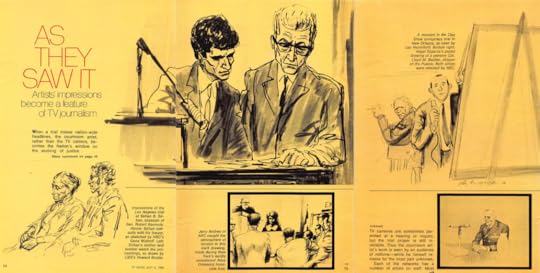
Few, if any, trials go without television coverage today (the last regular haunt of the courtroom artist might be the Supreme Court), and I think that's worked to the detriment of justice. Not because the lawyers or witnesses or judges are playing to the camera, though that certainly happens. (See: O.J. Simpson trial.) No, I think the problem is that the mystique, the grandeur of justice, is lost when it's filtered through a video camera. A still photograph can approach it, but even there it's destined to fall short. Modern courtrooms don't much look like temples of justice, to be honest; they more closely approach hotel conference rooms, kind of dull and boring, hardly the stuff of Perry Mason. With the courtroom artist, however, all the background noise is removed. You're focused on the defendant, the prosecutor, the spectator looking on, and you read everything in their faces, in what you see and what you don't see.
That's what I meant by that analogy to radio; in this world, the world of the artist, there's an inherent mystery at work, one filled in by the mind's eye. Maybe, just maybe, it would help us take it all just a little more seriously. Whether it deserves to be or not. TV
Published on July 08, 2023 05:00
July 7, 2023
Around the dial
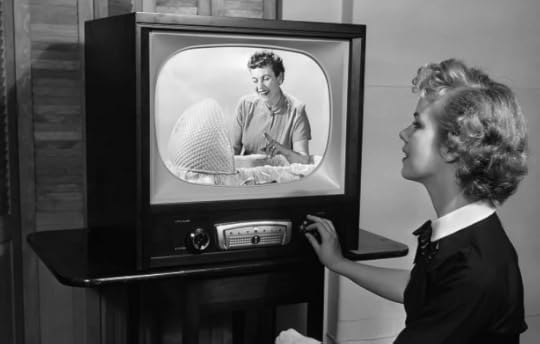
 If you haven't seen my latest podcast appearance, I'm with the great Ken Reid on his show TV Guide Counselor, where we talk about classic shows, the role of TV in American pop culture, and TV Guide (naturally). Plus, I shill for The Electronic Mirror! You can listen to the podcasts
here
, and you can buy the book
here
. Do it soon, before my next one comes out.
If you haven't seen my latest podcast appearance, I'm with the great Ken Reid on his show TV Guide Counselor, where we talk about classic shows, the role of TV in American pop culture, and TV Guide (naturally). Plus, I shill for The Electronic Mirror! You can listen to the podcasts
here
, and you can buy the book
here
. Do it soon, before my next one comes out.The temperatures here in Indiana have been close to 90 the last few days, which of course means it's a perfect time to check in with Joanna's Christmas in July at Christmas TV History. The latest is a look at the 1956 Alcoa Hour production of " The Stingiest Man in Town ," a musical adaptation of "A Christmas Carol" with Basil Rathbone, Vic Damone, Johnny Desmond, and Patrice Munsel. Thought lost for many years, it turnd up on DVD just a few years ago; of course, it's in our library.
John continues his series on The X-Files and the American Dream at Cult TV Blog, with examinations of "Young at Heart" and "E.B.E." In particular, the link between "E.B.E." and the deconstruction of the Dream is quite interesting.
Where were you on Wednesdays in 1972 ? A look at Comfort TV might refresh your memory, as David's series on 1970s TV arrives; among the best is NBC's winning lineup of Adam-12, Banacek (as part of the Wednesday Mystery Movie) and Search. On the other hand, CBS counters with The Carol Burnett Show, Medical Center, and Cannon, and ABC features the Wednesday Movie of the Week as its biggest entry. What an interesting night of programming.
Speaking of Movie of the Week, at Drunk TV, Paul reviews the 1975 teleflick Sweet Hostage , a kidnapping drama starring Martin Sheen (in one of his patented psycho roles that he did so well early in his career) and Linda Blair. I have a feeling Paul's review is a bit better than the movie itself.[
At Bob Crane: Life & Legacy, Carol takes on the wretched biopic Auto Focus , and how it completely (and deliberately) distorted Bob Crane's life story. I'm not surewould even make a good fictional story; as one that purports to represent fact, it's a dishonest failure.
All Bones Considered—isn't that a great name for a podcast? It tells the stories of people buried in the Laurel Hill Cemeteries near Philadelphia, two of whom are Dave Garroway and his wife Sarah Lee Lippincott. Jodie links to the episodes at Garroway at Large; spend some time listening to these fascinating stories.
I've been using televised highlights of 1960s and '70s U.S. Open golf tournaments as white noise lately (revisiting my youth, you know), which is a good lead-in to Roger and Mike's take on The Avengers episode " The Thirteenth Hole " at The View from the Junkyard. Is it a birdie or a bogey? Find out what they think.
That episode of The Avengers features Diana Rigg as Mrs. Peel, but at Cult TV Lounge we skip ahead to the Tara King era, with Linda Thorson leading the way in the episode " The Interrogators "—and how much better does it get when your guest star is the great Christopher Lee?
Martin Grams revisits one of the iconic shows of the 1980s: Miami Vice. (And by the way, in addition to being influential, is there any show around that epitomizes a decade the way that one does the Eighties?) See why you might enjoy the return trip, especially the first two seasons.
Last but not least, Maddy recalls the career of the wonderful Eve Arden at Classic Film and TV Corner. Maybe you remember her best for Our Miss Brooks and her later series The Mothers-in-Law, but her film career reads like an index of delightful movies. TV
Published on July 07, 2023 05:00
July 5, 2023
It's a courtroom drama and a game show
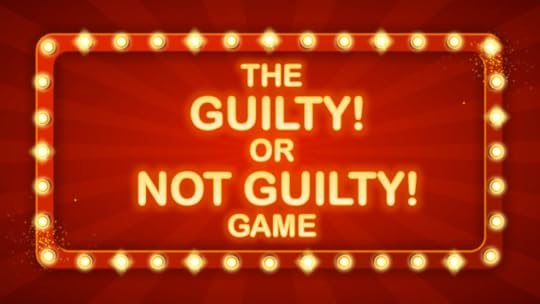
 Fans of classic television know all about subchannels like MeTV, Antenna, H&E, and the late, lamented Decades. But if you've ever surfed through the full range of subchannels in your area, you know there are two types of programs they can't live without: true crime shows and game shows. The problem is that you can't possibly keep track of the latest B-list celebrity trial while you're watching that episode of Match Game '76 where Charles Nelson Reilly tells the joke about Fannie Flagg's blank. If only there was some way to combine the two of them into one program, so that you can catch the Judge Steve Harvey show without missing Steve Harvey hosting Family Feud. But you've probably despaired at such a thing ever becoming a reality.
Fans of classic television know all about subchannels like MeTV, Antenna, H&E, and the late, lamented Decades. But if you've ever surfed through the full range of subchannels in your area, you know there are two types of programs they can't live without: true crime shows and game shows. The problem is that you can't possibly keep track of the latest B-list celebrity trial while you're watching that episode of Match Game '76 where Charles Nelson Reilly tells the joke about Fannie Flagg's blank. If only there was some way to combine the two of them into one program, so that you can catch the Judge Steve Harvey show without missing Steve Harvey hosting Family Feud. But you've probably despaired at such a thing ever becoming a reality. Until now.
Yes, thanks to The Two Ronnies—the 1970s British comedy sketch show hosted by Ronnie Barker and Ronnie Corbett—it turns out you can have it all: a program that's both a courtroom drama and a game show. Enertainment and a civics lesson, all at the same time; see how easy it is?
Personaly, I think a show like this has a lot of potential, but why limit it to the courtroom? It seems to me it would be an ideal format to adapt to C-SPAN's coverage of Congress. After all, there have to be places in the lineup for Let's Make a Deal and Sale of the Century, right? TV
Published on July 05, 2023 05:00
It's About TV!
Insightful commentary on how classic TV shows mirrored and influenced American society, tracing the impact of iconic series on national identity, cultural change, and the challenges we face today.
- Mitchell Hadley's profile
- 5 followers



